Lenovo Tech World 2024 — all the news as it happened
All the news from Lenovo Tech World 2024
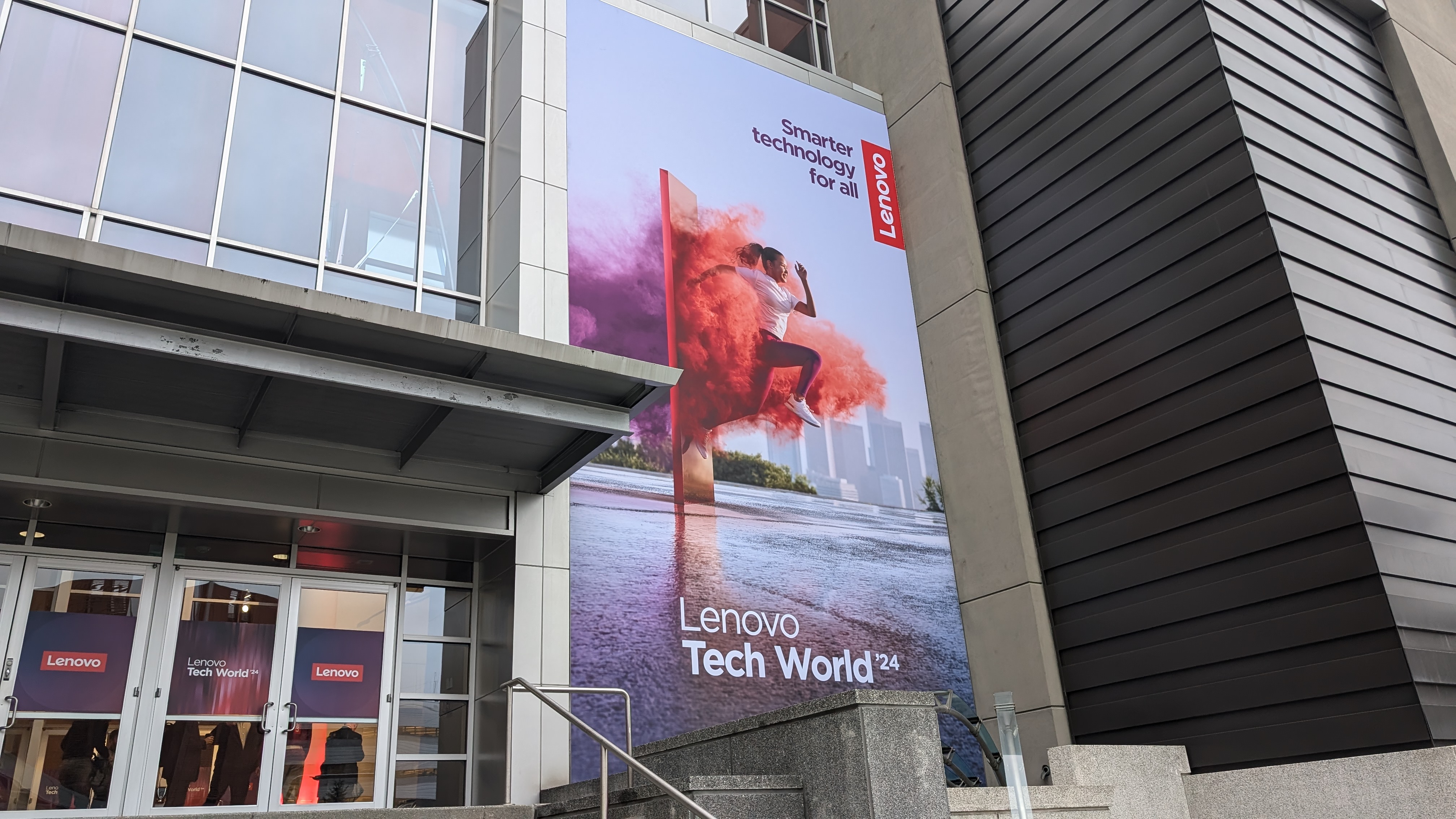
That's a wrap on our coverage of Lenovo Tech World 2024, covering all the latest news and announcements from the show.
It was a pretty packed event, full of news and updates on everything from AI PCs to data centers and much more.
Two keynotes from Lenovo Chairman and CEO Yuanqing Yang included special guests such as Nvidia CEO Jensen Huang and AMD CEO Dr. Lisa Su - and if you missed anything, you can catch up on our coverage as it happened below.
Lenovo Tech World 2024 news
Good evening from Seattle - well, actually Bellevue, a lush, green suburb that houses (among other things) the Meydenbauer Convention Center.
Tomorrow, we'll be there for a keynote from Lenovo Chairman and CEO Yuanqing Yang, who has a host of special guests set to join him on stage.
The line-up includes no less than Intel CEO Pat Gelsinger, Microsoft CEO Satya Nadella, AMD Chair and Chief Executive Officer Dr. Lisa Su, Meta Founder & CEO Mark Zuckerberg - so you won't want to miss it!
Good morning from Seattle, where we're up and ready for day one of Lenovo Tech World 2024.
We'll be heading over to the conference shortly, so stay tuned for all the updates today!

We've arrived! It's a chilly morning here, but we're here nice and early for a tour of the show floor, before the main keynote begins in about two hours time.
We're here! Lenovo Chairman and Chief Executive Officer Yuanqing Yang will be taking to the stage soon...
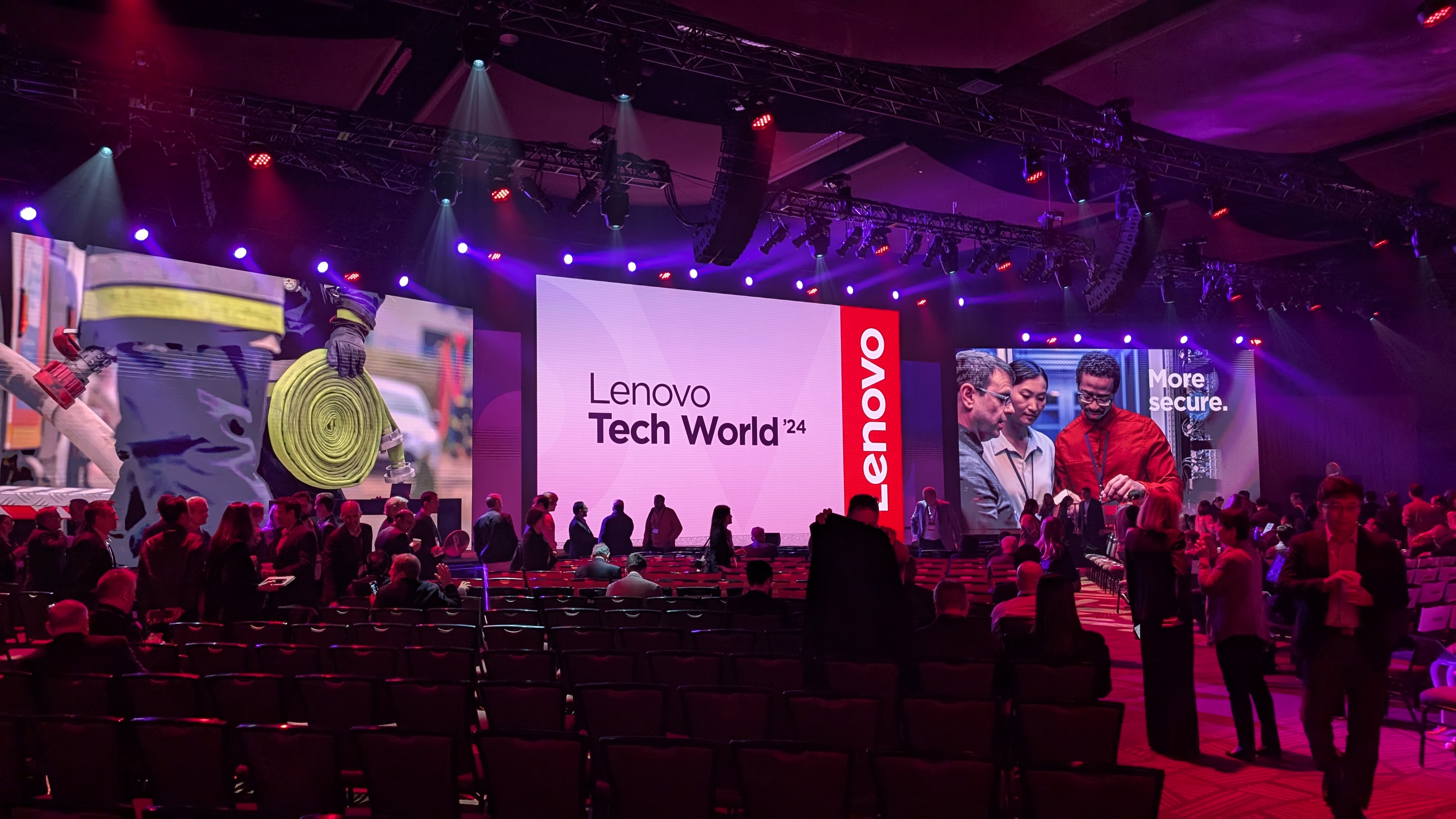
The lights go down, and Lenovo Chairman and Chief Executive Officer Yuanqing Yang takes to the stage.
"We use the power of AI to preserve the most cherished things," he notes.
"It's all about using AI to build a smarter future, together...AI is real, it's not a fleeting trend or inflated bubble."
It is already leading to great productivity and efficiency, he adds - now it's time to reimagine the future for AI.
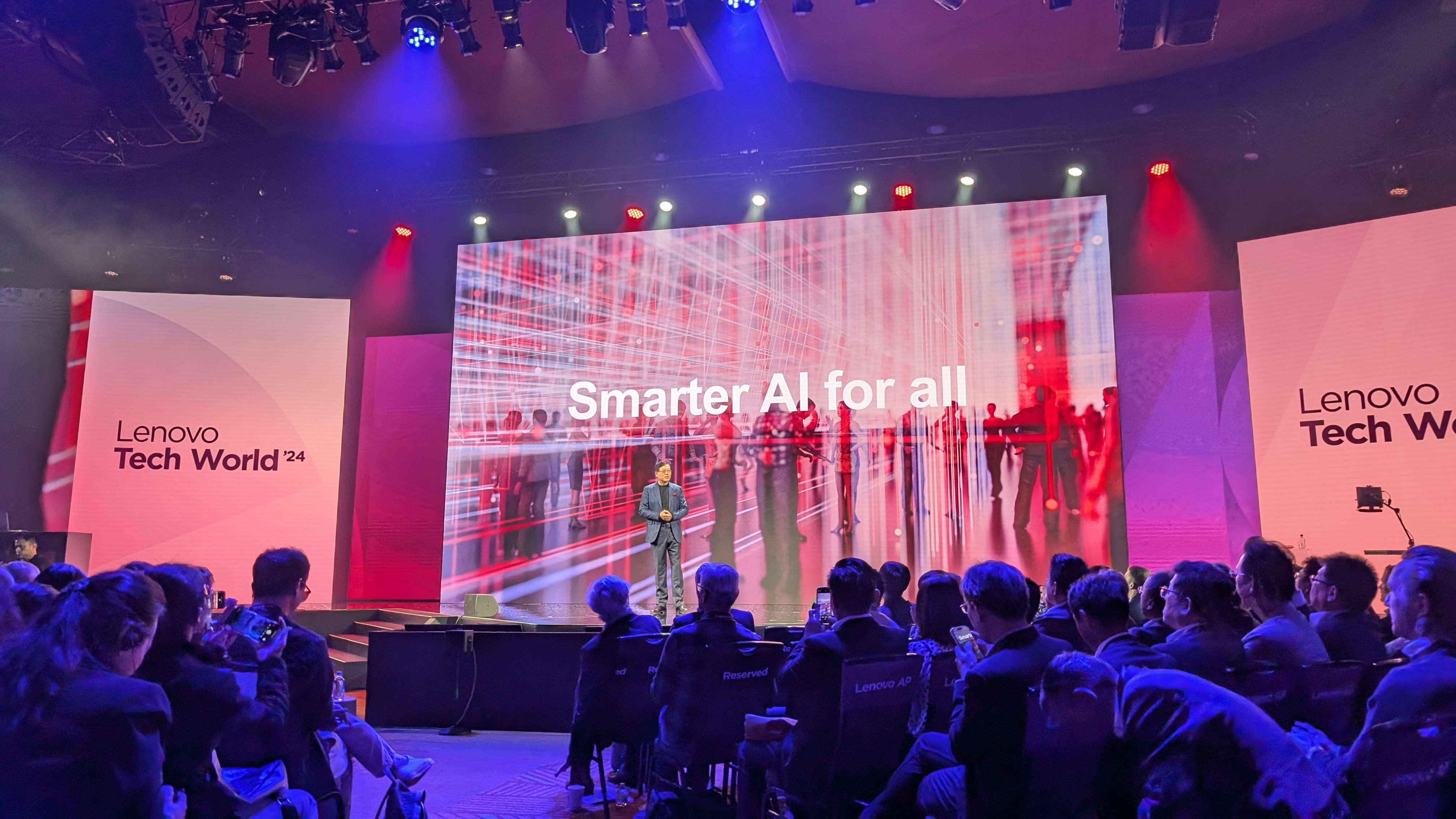
This is the age of "hybrid AI", Yang notes - as personal, enterprise and private AI models work together.
Demand for enterprise AI, in particular, has never been higher, he says - bringing together public and private AI models.
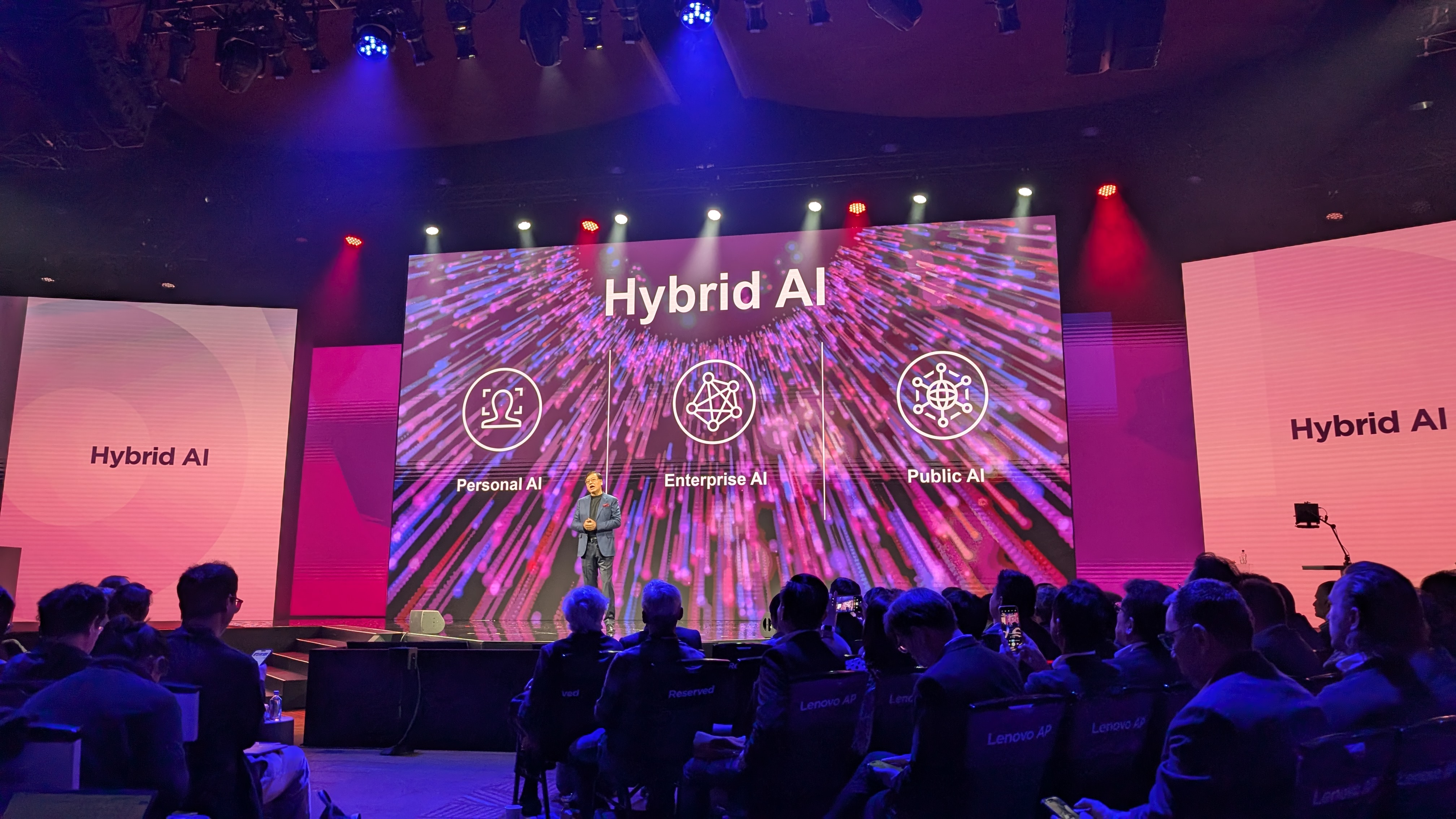
How do we satisfy the raising demand for AI? Yang asks - through partnerships.
Lenovo's personal AI agent is a good start - looking at a personal knowledge base, connected to an open ecosystem, and access to heterogenous computing.
The company is launching its first AI agent today - Lenovo AI Now. This can bring together all the files, messages and documents you need, bypassing the cloud in order to greatly boost efficiency.
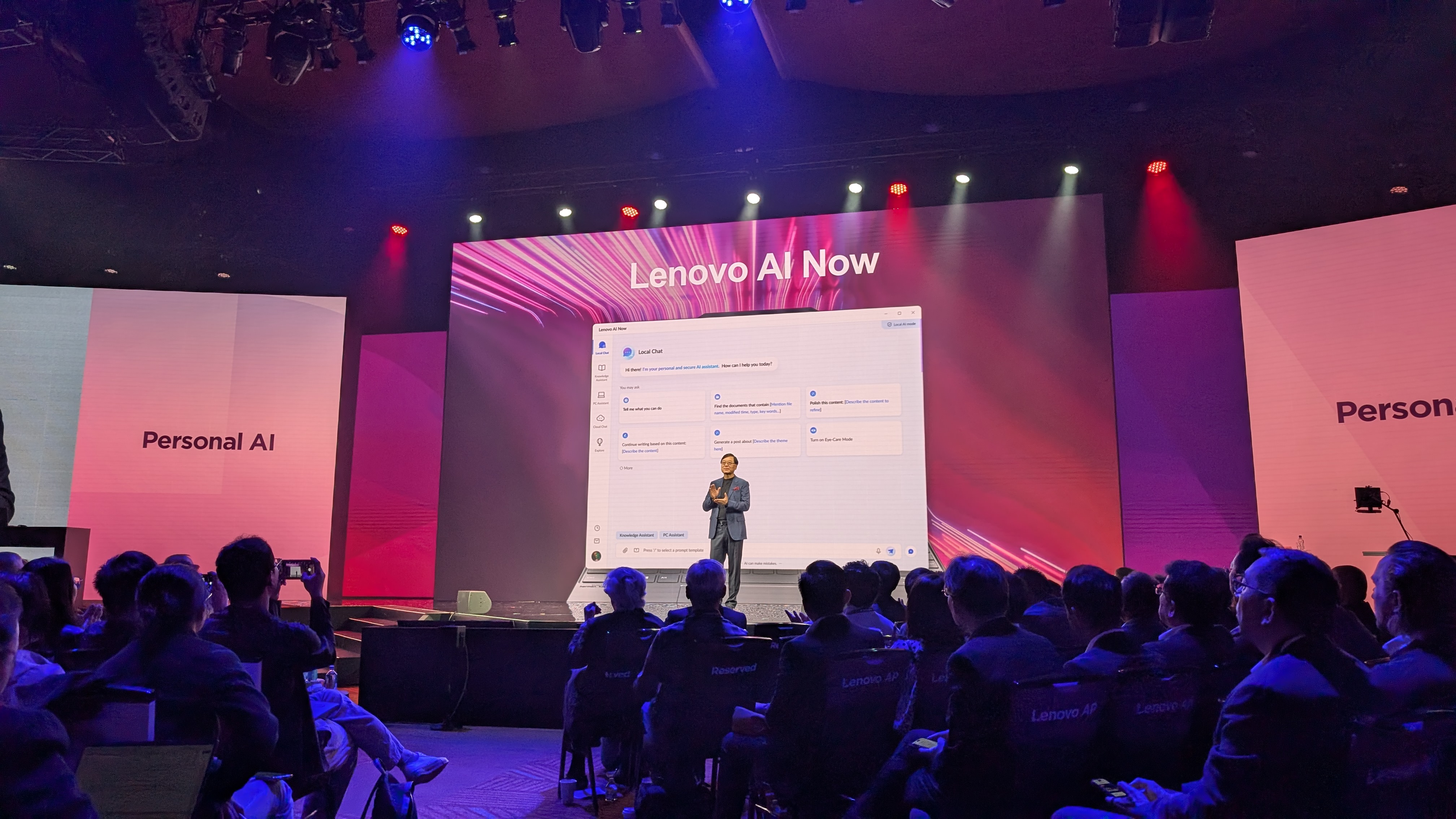
After a few other demos, showcasing how the agent can help content creators, and students studying ahead of university access, it's clear Lenovo wants the system to have a wide range of use cases.
Yang returns to the stage, and moves towards talking about personalized computing, and devices.
Hardware has never been more important in laptops - and Intel has been a long-term partner for Lenovo, with the two companies collaborating on the Aura Edition PCs.
After a quick demo showing what the Lenovo Smart Share function can do for PC users, it's time to hear more about the partnership - and Yang welcomes Intel CEO Pat Gelsinger to the stage.

Gelsinger says this is "the AI era" - and it's an incredibly time to be in technology.
He likens it to the initial age of the Internet, with the same impact for users everywhere.
"It will fundamentally change the relationships between people and technology," he notes, "every person with a PC has AI at their fingertips."
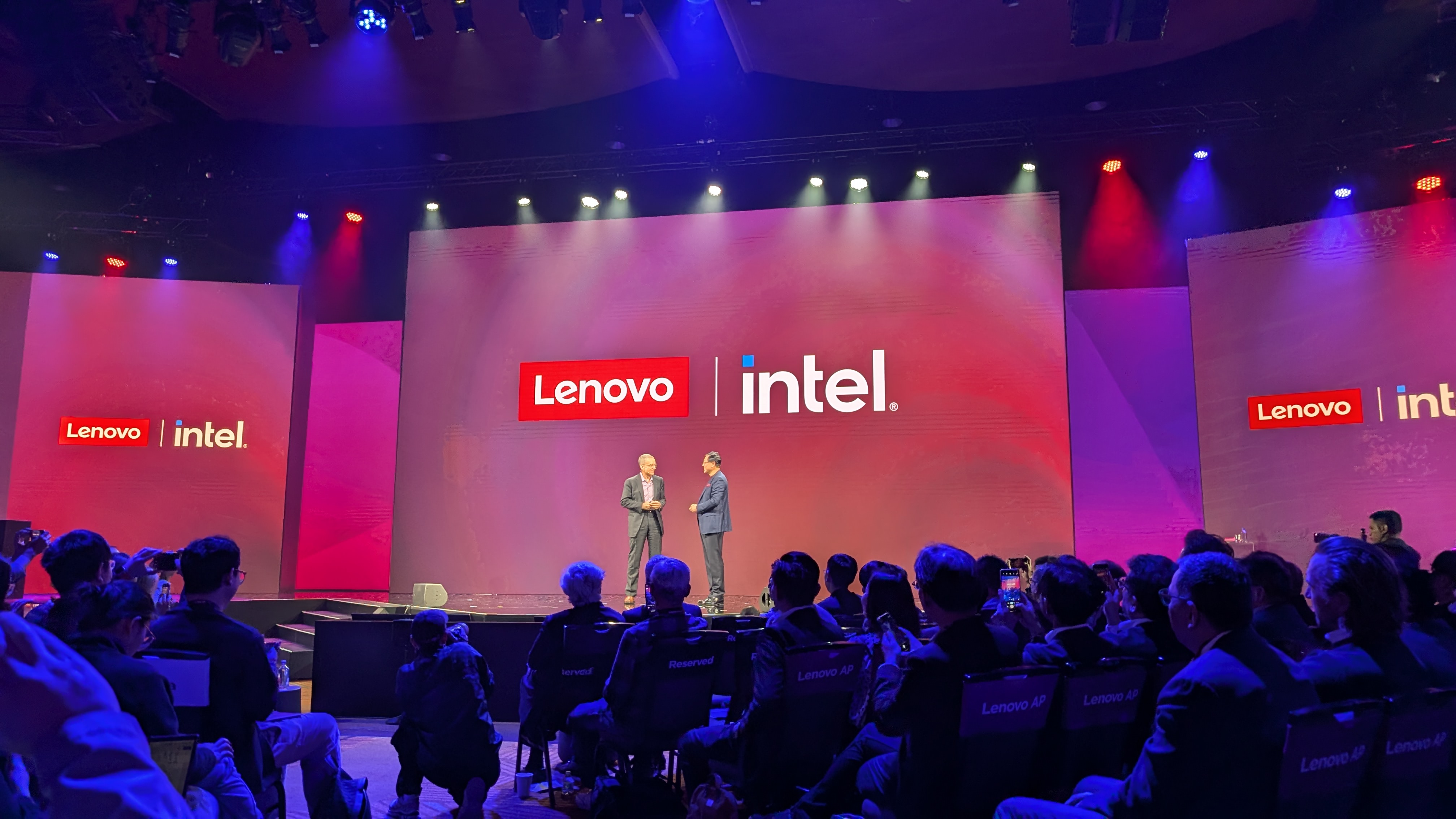
All PCs will be AI PCs by 2030, Gelsinger quotes, with over 20 million AI PCs already shipped.
He notes Intel and Lenovo have done business for decades, with his company helping establish the company as the tech heavyweight it is today.
Gelsinger talks about the x86 advantage, offering customization, compatability and scalabaility, with a new x86 ecosystem advisory group set up just this week with AMD.
Gelsinger says he is (unsurprisingly) a Lenovo Aura Edition PC users - powered by Intel Core Ultra, of course.
This is "a new era of innovation" between the companies, he adds - across not just the PC, but edge, datacenter, IoT and network.
Yang returns for another mini love-in - it's clear these two are great buddies.
As a little surprise - Gelsinger shows off the first Panther Lake chip - something to come at CES 2025, no doubt.
Gelsinger heads off.
Having one personal AI across multiple devices is the Lenovo vision of the future, Yang notes - with AI at the center of everything.
This includes all-new 3D experiences, without needing heavy headsets or clunky kit - more on that to come later.
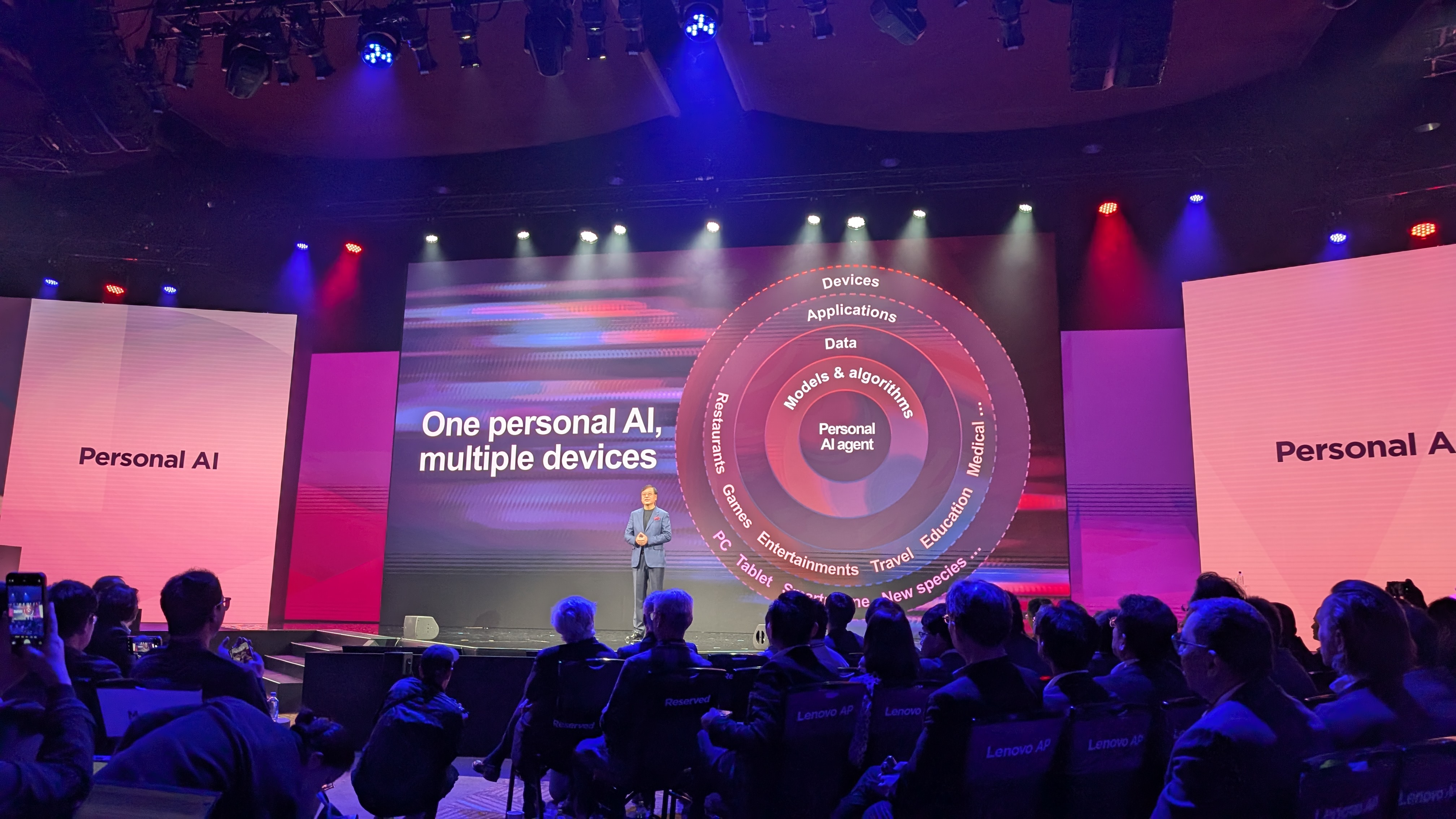
Lenovo has long worked with Microsoft for Copilot+ PCs - and to hear more, here's Microsoft CEO Satya Nadella (sadly, only on video...)
Sadly, it's a very brief cameo, but it's clear the two companies will work closely on AI PCs in the future.
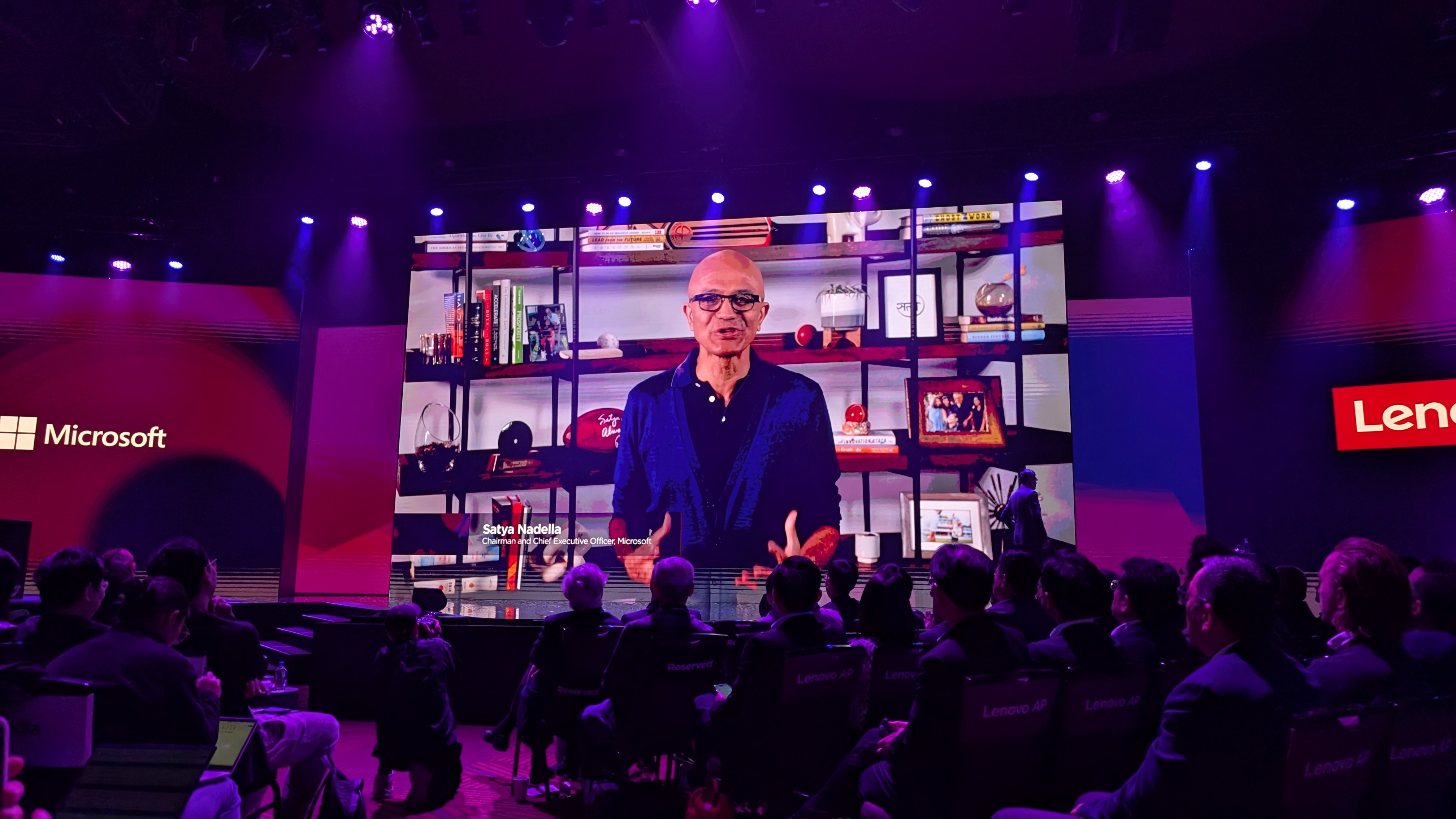
Now we move on to enterprise AI, with Yang focusing on security and customization alongside productivity and efficiency.
Hybrid infrastructure is needed to support enteprise AI, from client to edge to cloud - all feeding into AI models for trending and inferencing.
The Lenovo AI library will be the key to helping unlock all of this - a suit of ready-to-customize horizontal and vertical solution accelarators.
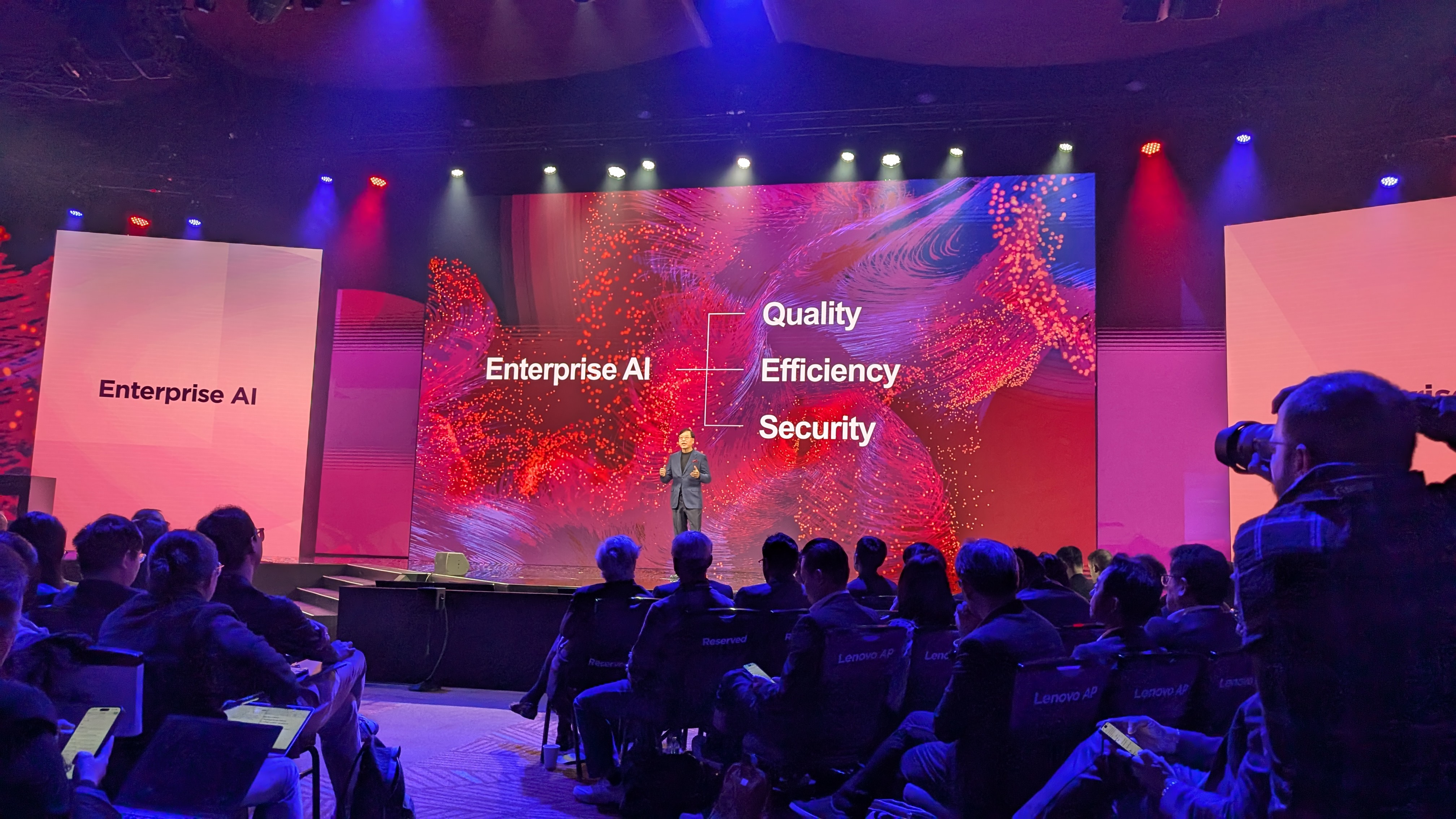
Sustainability is another big focus, with Yang noting the company's efforts to re-use hardware, but also focus on greener energy, and an R&D focus on design for sustainability.
Lenovo has announced its 6th generation Neptune liquid cooling solution, which promises major advancements over traditional air-cooling, reducing energy consumption by up to 40%, and 98% of all heat transferred to the water loop.
This all means customers can pursue AI development goals with greater power.
One of its biggest customers is AMD - and chairman and CEO Dr. Lisa Su takes to the stage.
"This is an incredibe time we're living in today for AI," she notes. "AI is truly the most important technology I've seen in my career."
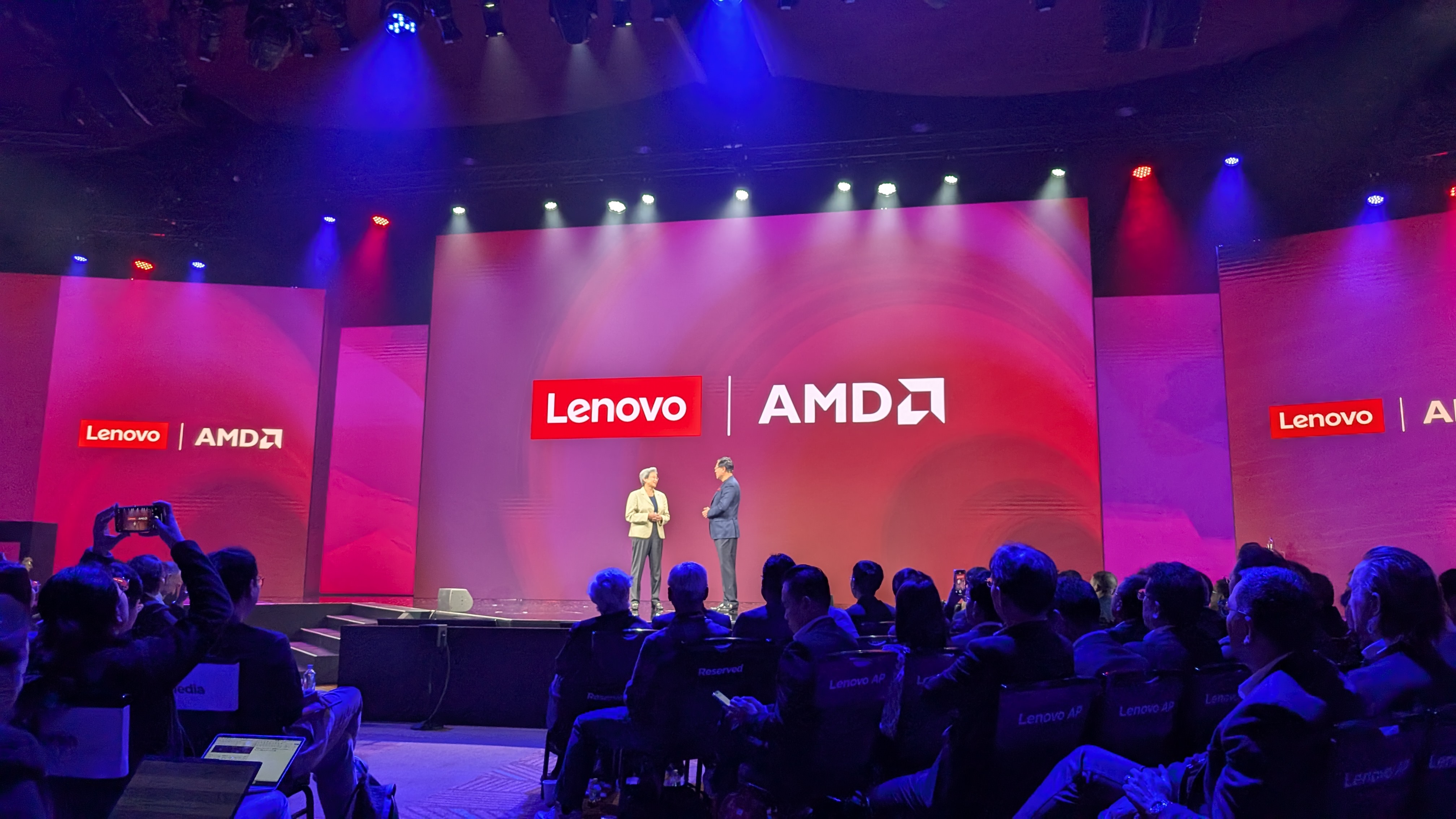
AMD and Lenovo's partnership is largely in the data center, and Su notes the recent launch of the 5th Gen AMD EPYC hardware - which she unsurprisingly says is the best CPU for cloud, enterprise and AI, and its Instinct MI300X and MI325X accelerators.
"At the end of the day, everyone wants more AI compute", she notes. "It's all about getting the best compute to as many users as possible."
Su also notes this is all about an open ecosystem.
"We want an ecosystem that allows everyone to innovate above the base hardware," she says.
AMD is now supporting over a million models, she notes.

With that, Su leaves the stage, and Yang turns to the company's vision of "smarter AI for all".
"Lenovo is optimistic about the possibilities presented by AI," he notes, highlighting a company project that has created "an AI-powered digital twin" of a thousand-year-old wooden pagoda, giving an immersive experience for users everywhere.
Mixed reality is another key area for Lenovo - so to hear more, here's Meta CEO Mark Zuckerberg...(again only on video)
He's here to talk about open source AI models, particularly LLama, which he says can be "like the Linux of AI".
Again, Lenovo showing the power of its partnerships - and Zuck still looks pretty rad too.
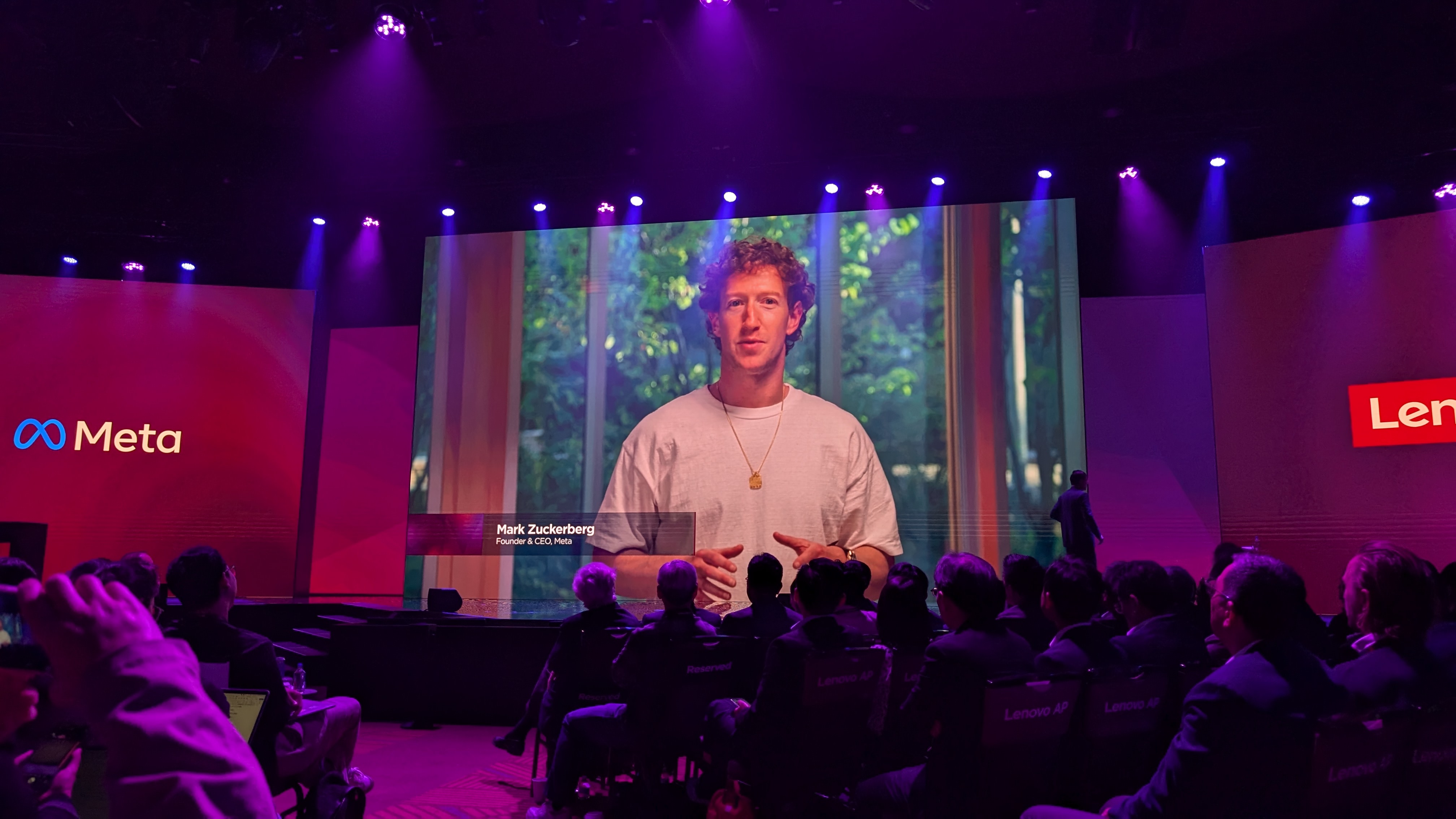
"As we stand on the brink of a new era of AI, we have the opportunity to take on some of the biggest challenges," Yang notes.
"This is not just a dream, but it is within our grasp," he says, closing out his part of the speech.
We welcome Dr Tolga Kurtoglu, Lenovo CTO to the stage.
He's here to talk about unleashing human potential through AI.
"The future of AI is all about enabling humans to do what humans do best," he says, by providing information via cognitive intelligence, sensory intelligence, and "connectional intelligence".
"The next 20 years will be about watching these forms of intelligence converge around us," Kurtoglu declares.

This is moving to the era of "augmented intelligence".
The future of AI is not just about digital tools, but also digital companions, he says.
Kurtoglu outlines how AI agents are the next step, with continued technical innovation pushing this forward, so that they know you, understand you, and then work for you.
"This is when AI becomes proactive, rather than reactive," he says - welcoming Allie Miller, CEO of Open machine to the stage.
The future of AI is going to be predictive, personalized and proactive, Miller says, with 2024 definitely the year of "multimodal AI".
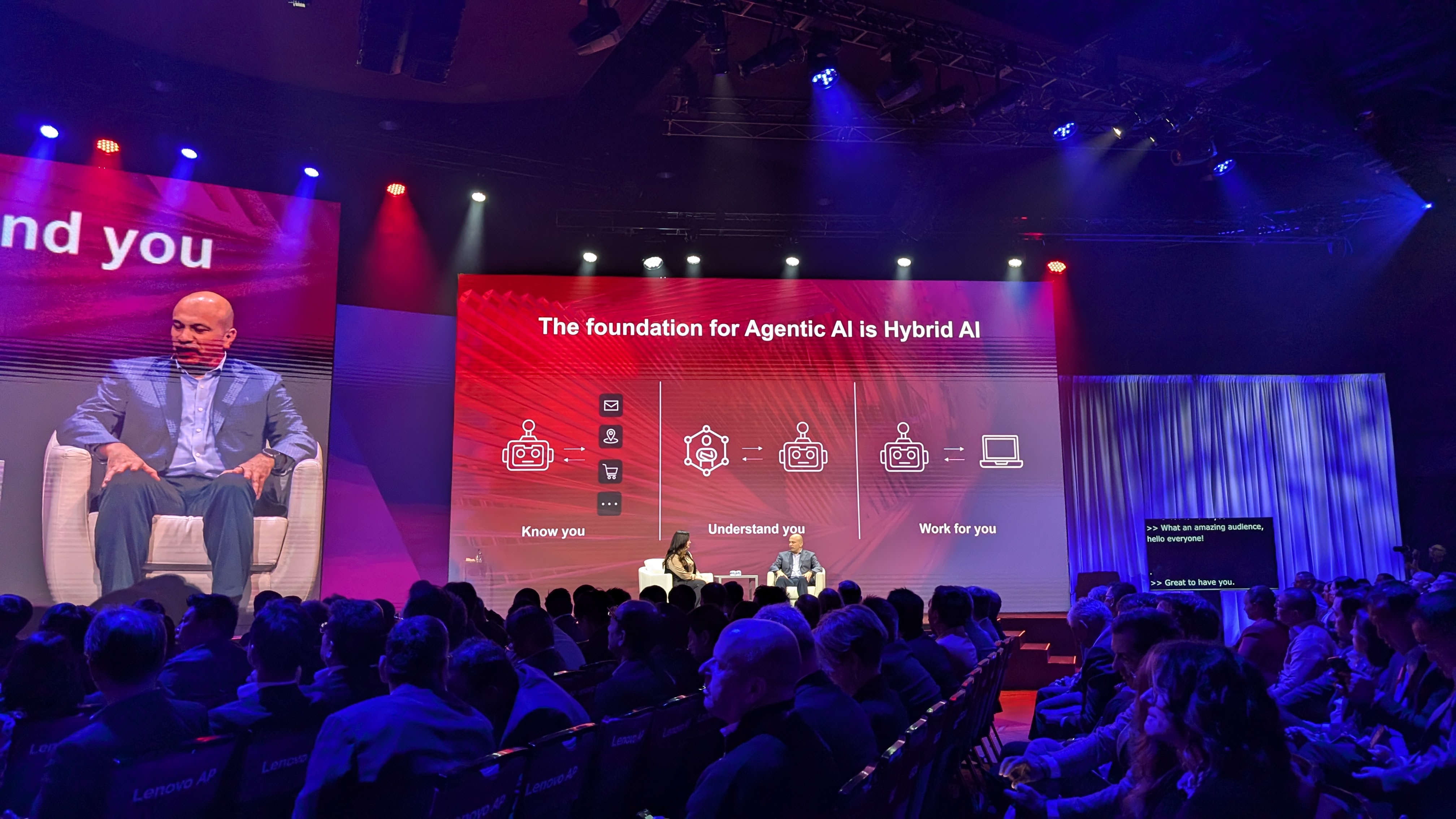
"The moment is now to push AI into its next era, and Lenovo is in charge," Kurtoglu declares.
He notes the company's end-to-end, AI-optimized portfolio, fulled by a commitment to a user-first approach, puts it in a great place - coupled with its innovation alongside big-name partners across the board.
"Smarter AI enhances and unleashes human potential."
Next up is Doug Fisher, Lenovo chief security and AI officer, for some reason reporting from the show floor, rather than the stage.
He outlines Lenovo's pledge to build AI models that are responsible and fair, rooted in privacy, transparency and accountability.
AI products should do no harm, or infringe on rights, he notes.
"Our goal is to build and develop AI solutions that solve real problems, and improve lives," Fisher says.
"We're unlocking a smarter future with AI solutions that serve everyone, everywhere."
Luca Rossi, EVP of Lenovo's intelligent devices group, is next up on stage, to focus on devices and solutions.
"Our goal is to create a world where everyone can access technolgoy that makes the world better," he says.
"We are not just imagining the future - we are inventing it."
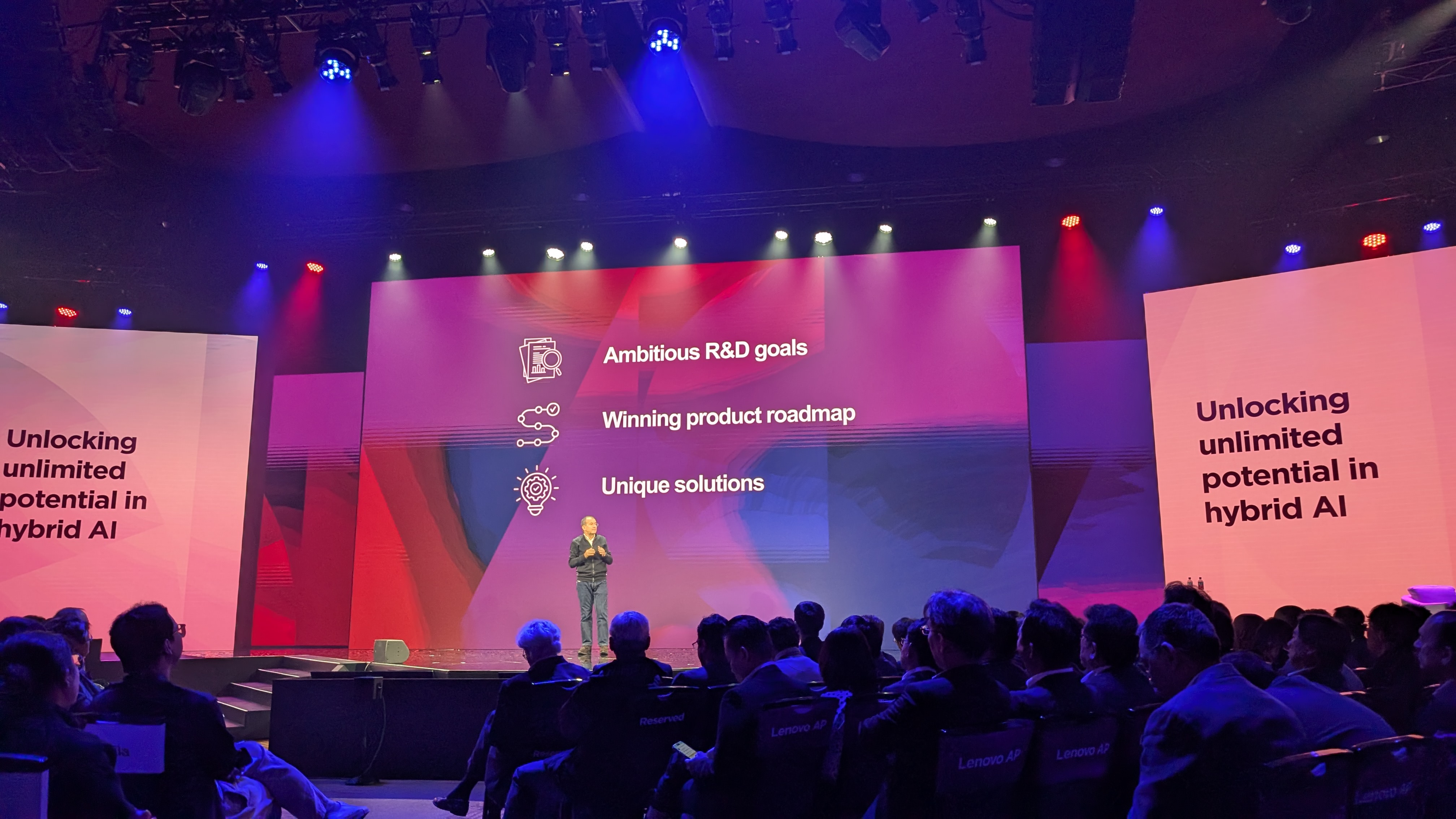

Following a video showing a range of use cases, Rossi notes that Lenovo can offer an unmatched set of hybrid capabilities, with a presence in all kinds of devices and ecosystems.
"We are setting the bar," he notes, welcoming Cristiano Amon, CEO and President of Qualcomm - again by video.
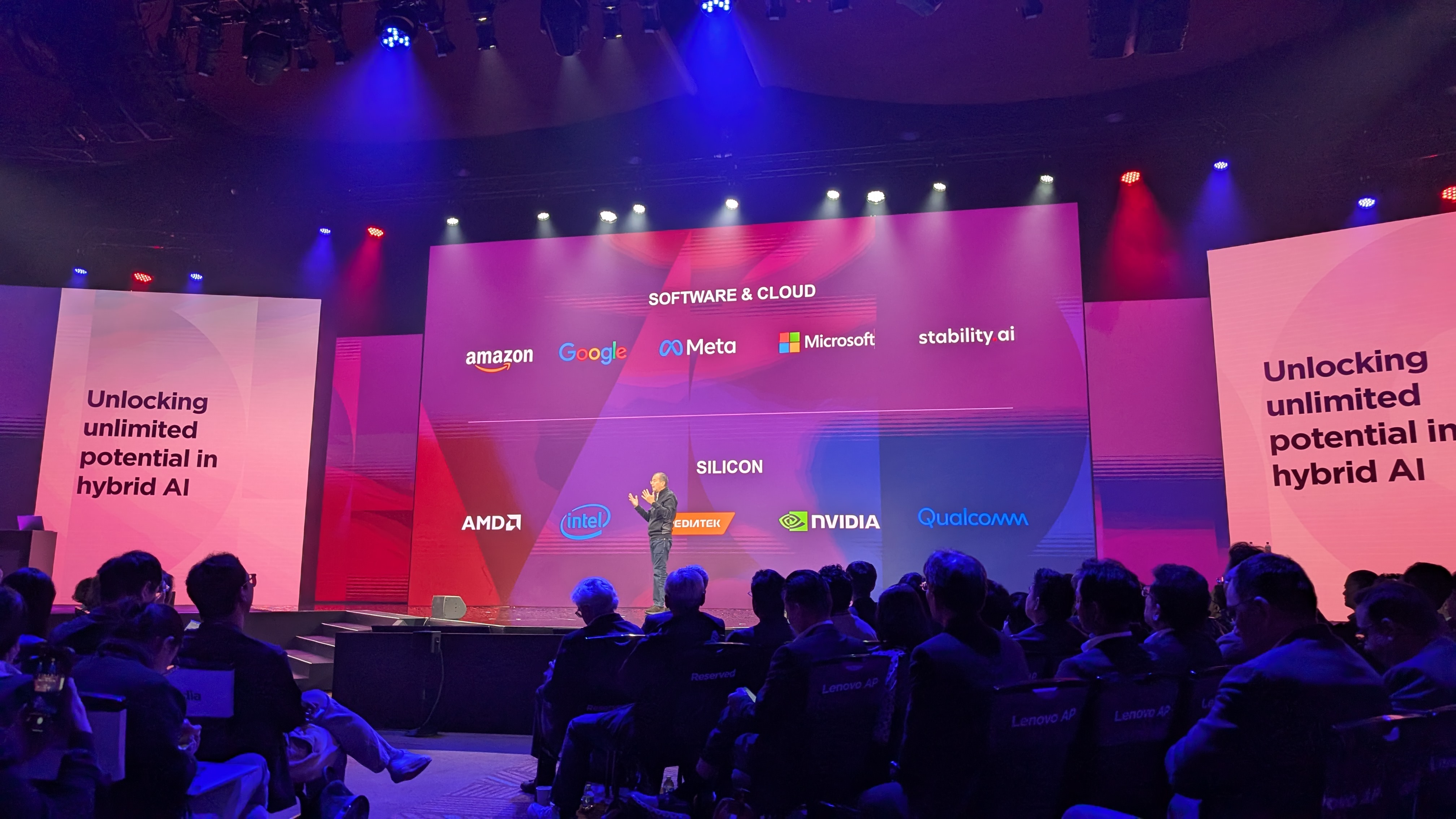
The partnership between Qualcomm and Lenovo has led to smarter, more flexible computing devices across the board, Amon notes.
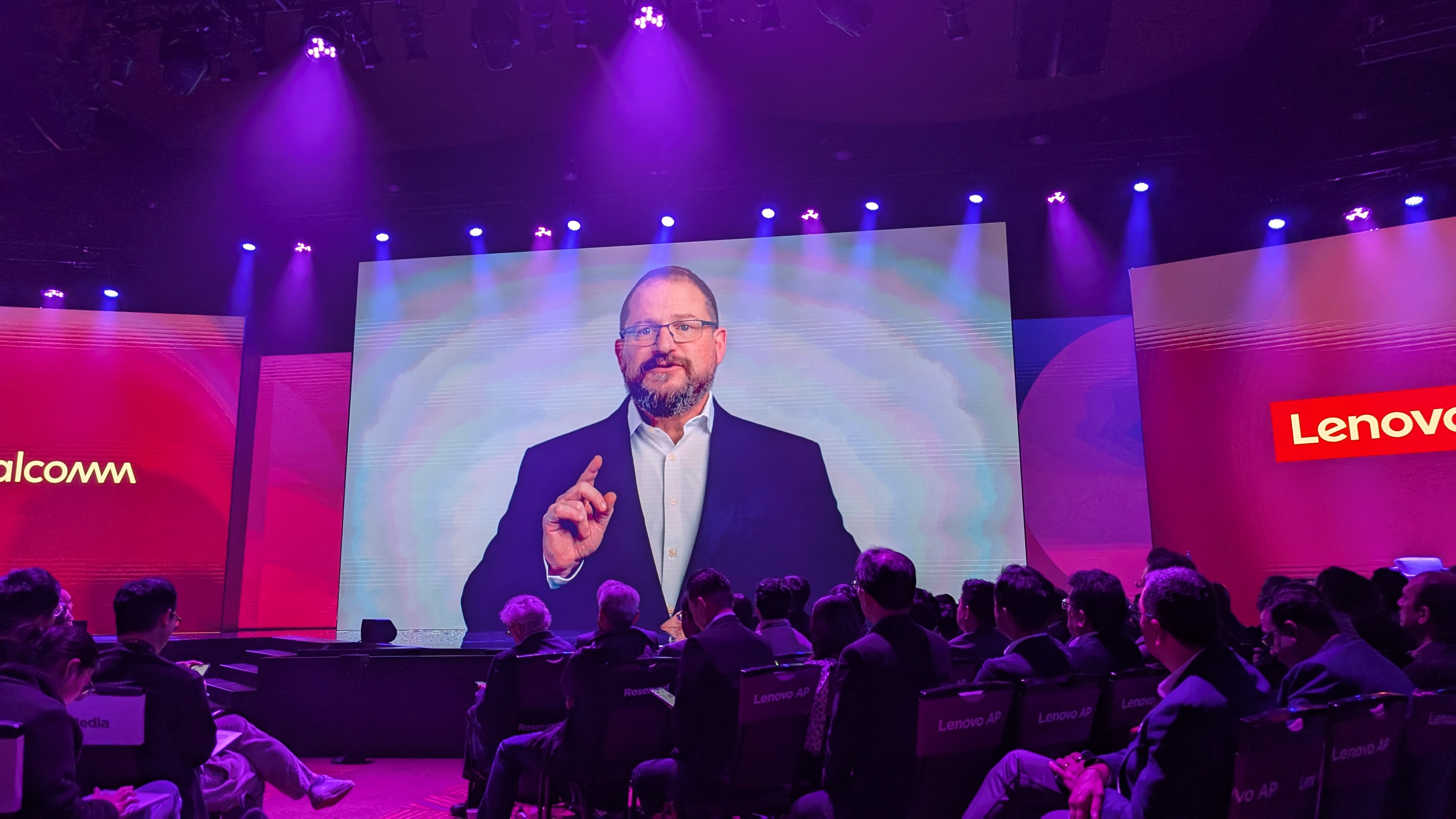
We're then given a first look at the new Lenovo ThinkPad X1 2-in-1 Aura Edition, combining the convenience of a laptop and a tablet, with smart features and over 18 hours of battery life - launching early 2025.
"These devices will feel less like tools, and more like usable extensions of ourselves," Rossi declares.

Next on stage is another Microsoft representative - this time Asha Sharma, CVP, Product, AI platform.
She notes that Microsoft has long worked to make sure AI is safe and secure, based on a solid set of frameworks and rules.
Rossi announced AI PC Fast Start, a new service to help accelerate and optimize a company's AI PC journey - getting your business up to speed quickly.
Then we're giving a demo of Smart Connect - a service that lets users quickly share and collaborate on work across devices.
The tool can use AI capabilities to enrich your files and images, boosting creativity and productivity for users everywhere.
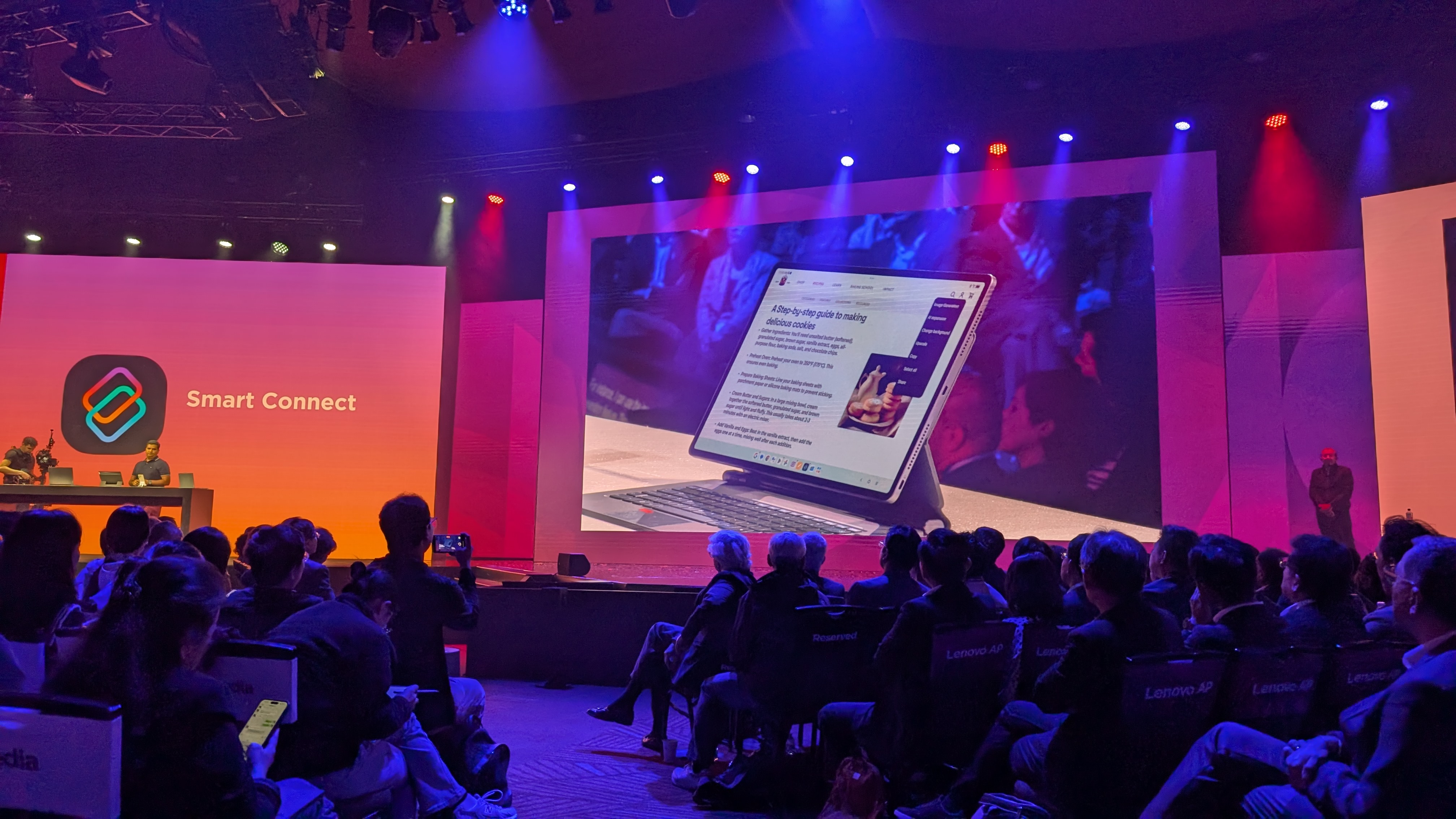
There's also a look at a proof-of-concept of a rotating laptop that follows users as they walk around a room (say if you were presenting on a seperate whiteboard), as well as a slightly terrifying "AI Brain" that looks to be a smart hub for the whole family.
Lenovo is of course the parent company of Motorola, and we get a quick look at the firm's efforts to "put AI in your hand".
Three main areas are the focus, assist, create, and capture - Moto AI looks to cover all of this, from screenshots to packing suggestions and AI hints.
And with that, it's a wrap on this morning's keynote - we'll be back for the afternoon session though, which features no less of a special guest than Nvidia CEO and leather jacket enthusiast Jensen Huang.
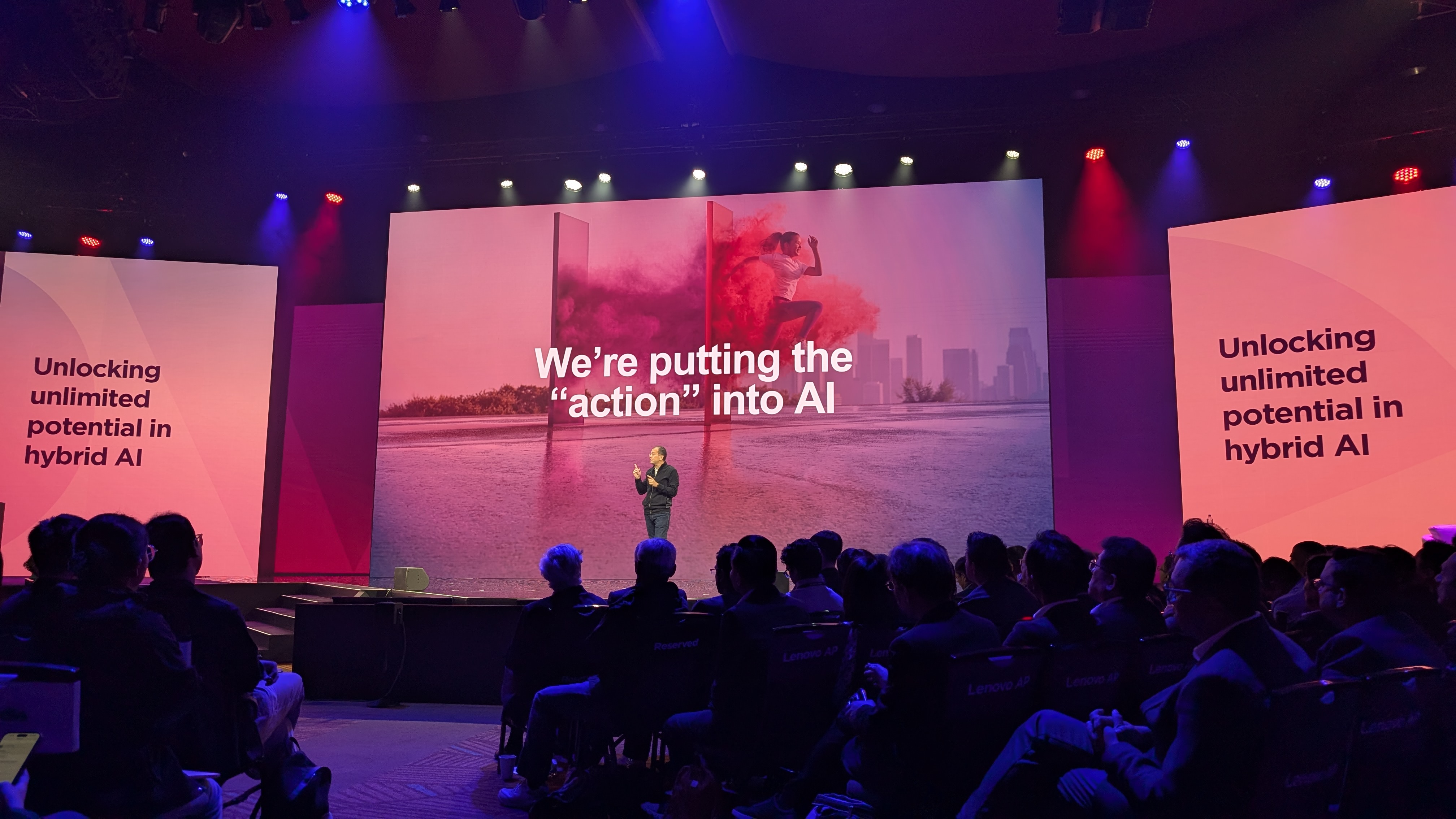
We're back for the afternoon keynote. Entitled, "Smarter AI Innovates Faster in Every Industry", this session will see Lenovo Chairman and CEO Yuanqing Yang host another wide-ranging talk, with VIP guest Jensen Huang, CEO and co-founder of Nvidia.
But we've also been promised more information on Lenovo's new hardware and services launches, so stay tuned for all the latest updates...
It's time to begin - after some truly painful dad jokes and comedy puns, we're underway with a showcase of some of Lenovo's new solutions.
First up is NewTalk, an AI-enablement tool which can greatly speed up RAG queries for developers and other users, boosting efficiency all-round.

Now it's time for Vlad Rozanovich, SVP, infrastructure solutions group at Lenovo, to talk data center tech.
"We're looking at, how do we adopt generative AI...and ensure the security is where you need it most?"
"When we're looking at what AI can bring to the enterprise, there's an excitement that all enterprises are seeing."

Along with the benefits of utilizing data and boosting sustainability, the ability to define an ROI is also crucial, he notes.

Keeping the right mix of public and private AI is going to be vital, Rozanovich notes - and creating the right solution for Gen AI workloads will make all the difference.
Luckily enough, Lenovo can help with this, with its end-to-end portfolio giving a range of options for companies of all sizes. It has over 80 products optimized for AI, from laptops to routers to full-on racks.

After a video showing off the scale of Lenovo's partner ecosystem in the field of hybrid AI, it's time to talk a look at one particular area - healthcare, with Banner and Aetna joining Rozanovich on stage.
AI and healthcare are coming closer together than ever, with the technology able to help with new research, but also making healthcare more affordable and more efficient.
Next up, we're looking at sustainability.
Rozanovich hints at the "massive amounts of power" needed to carry out AI tasks. Along with its upgraded 6th gen Neptune liquid cooling technology, the company is also boosting rack optimization that should help businesses of all sizes maximize their space.

Turning to ROI, Rozanovich mentions scale as a key consideration for customers.
Lenovo has its own "True Scale" GPU-as-a-service platform, and also looks to promote its work through the MOC Alliance, which uses the company's kit for further research.
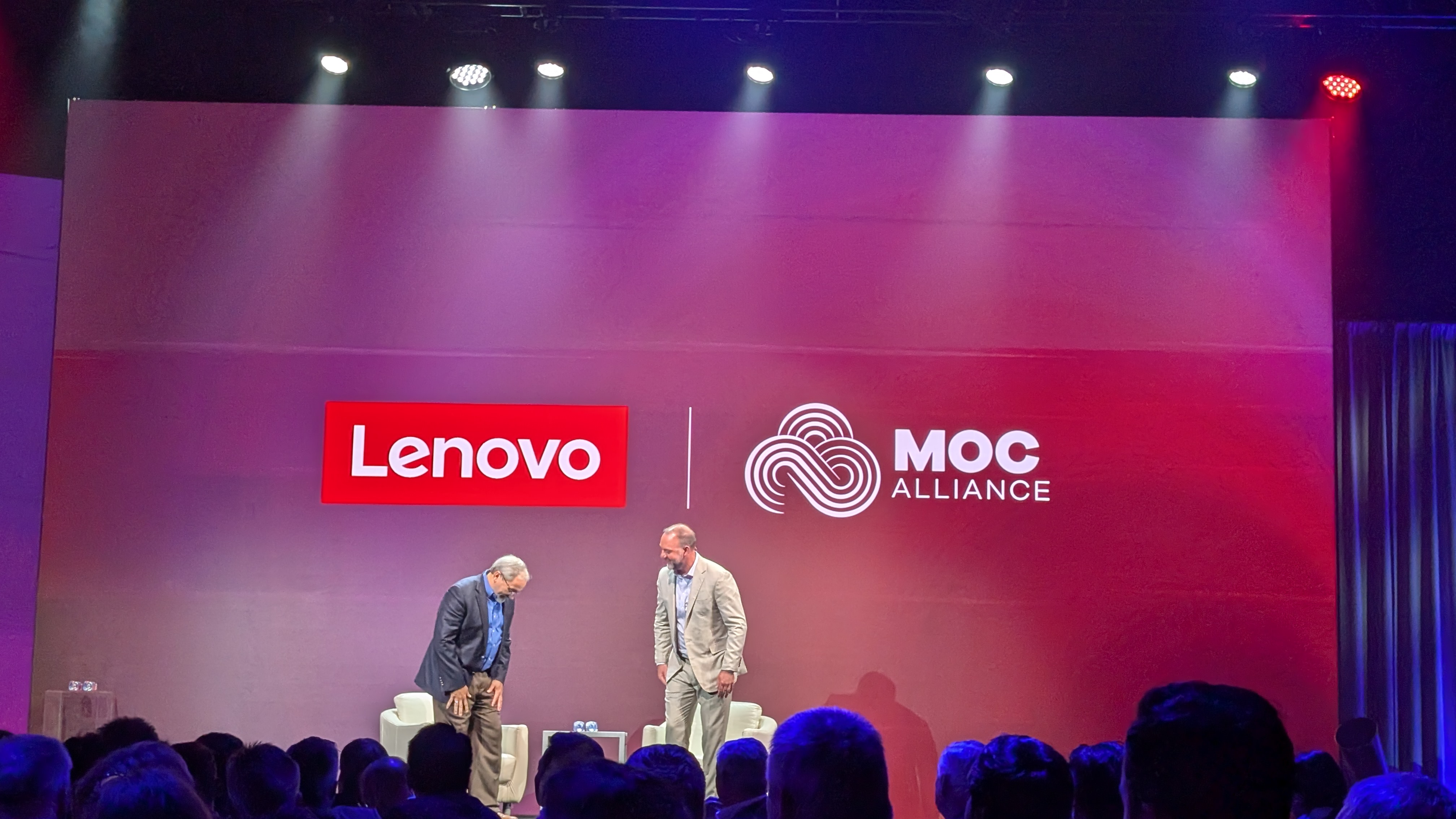
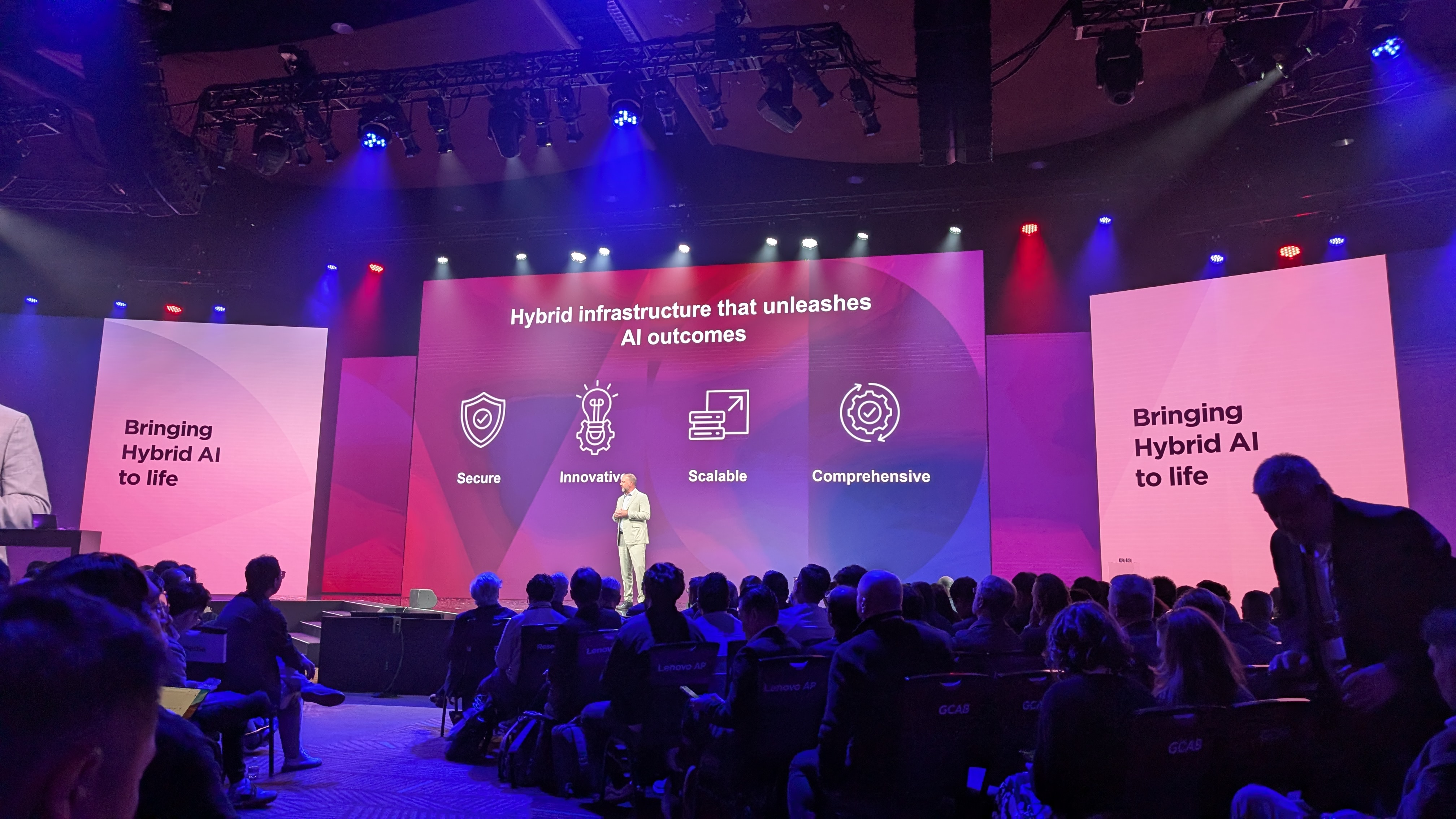
Moving to more on the sustainable angle, we switch to Laura Quatela and Mary Jacques, to focus on innovation and operational AI.
"We understand that AI is a powerful too...but we have to prioritze measureable solutions," notes Quatela.
Lenovo says it's committed to achieving net-zero emissions by 2050.
Next up is Dr Yong Rui, SVP of emerging technolgoy group, to talk about automotive AI.
This could be the next big computing field, he notes, as the automotive industry undergoes a massive shift towards a central/zonal architecture.
It could also be the next big AI opportunity, with the technology allowing for a massive jump forward.
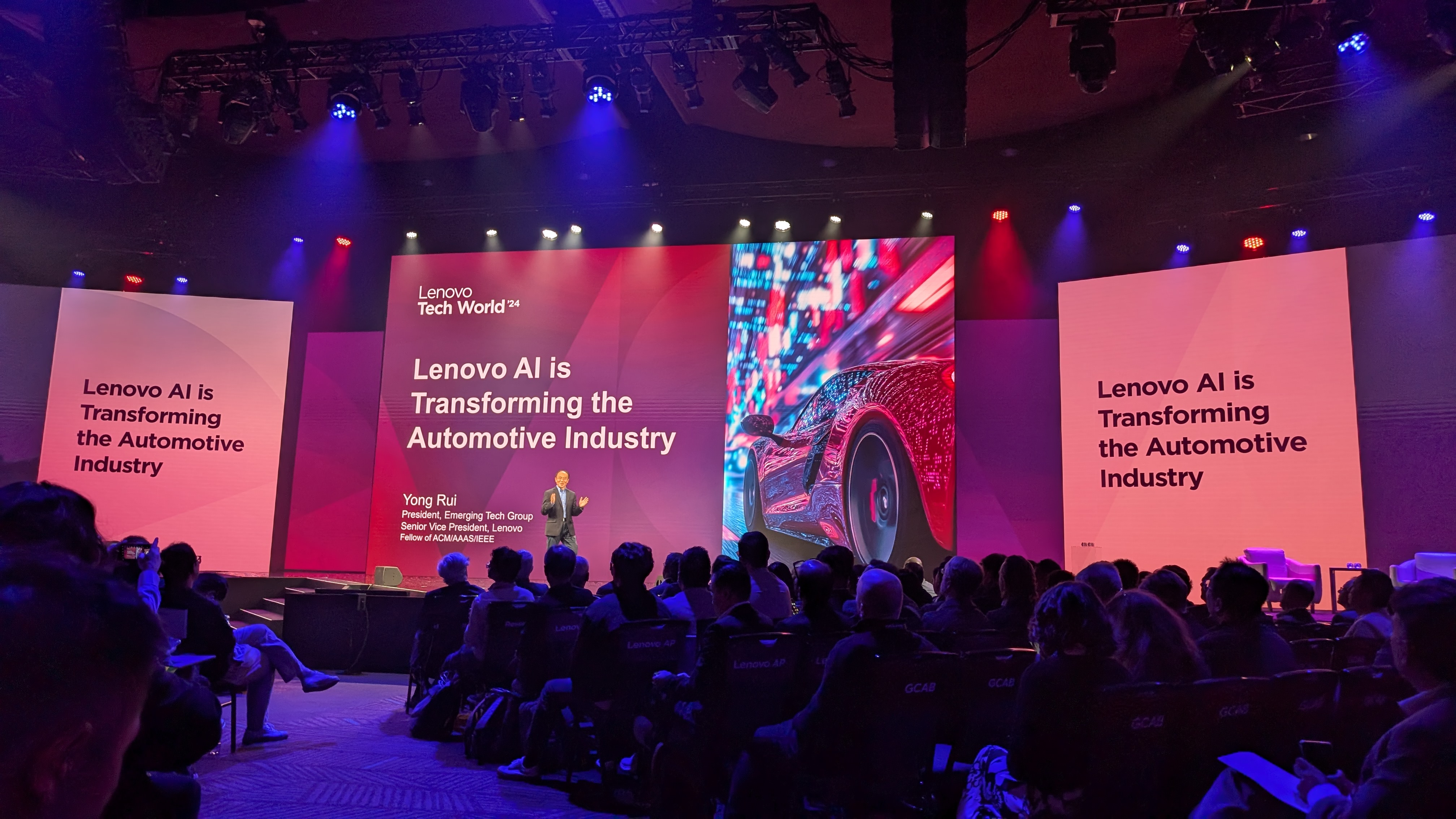
We're shown a video which showcases Lenovo and Nvidia's work on building automotive-specific AD1 hardware, allowing for smarter and safer journeys.
Dr Rui says this makes it "the most powerful and secure platform for end-to-end autonomous driving" - with superior performance, boosted safety and security, and fast time to market, making it the best all-round choice.
Alongside possibily obvious use cases such as navigation and entertainment, there is an opportuntiy for greater synergy across Lenovo and Motorola devices, Dr Rui notes.
Ali Kani from Nvidia comes on stage to highlight more on how the platform works. Vehicles are increasingly being software-defined, he notes, but high-performance compute within a car can really help with machine learning apps.
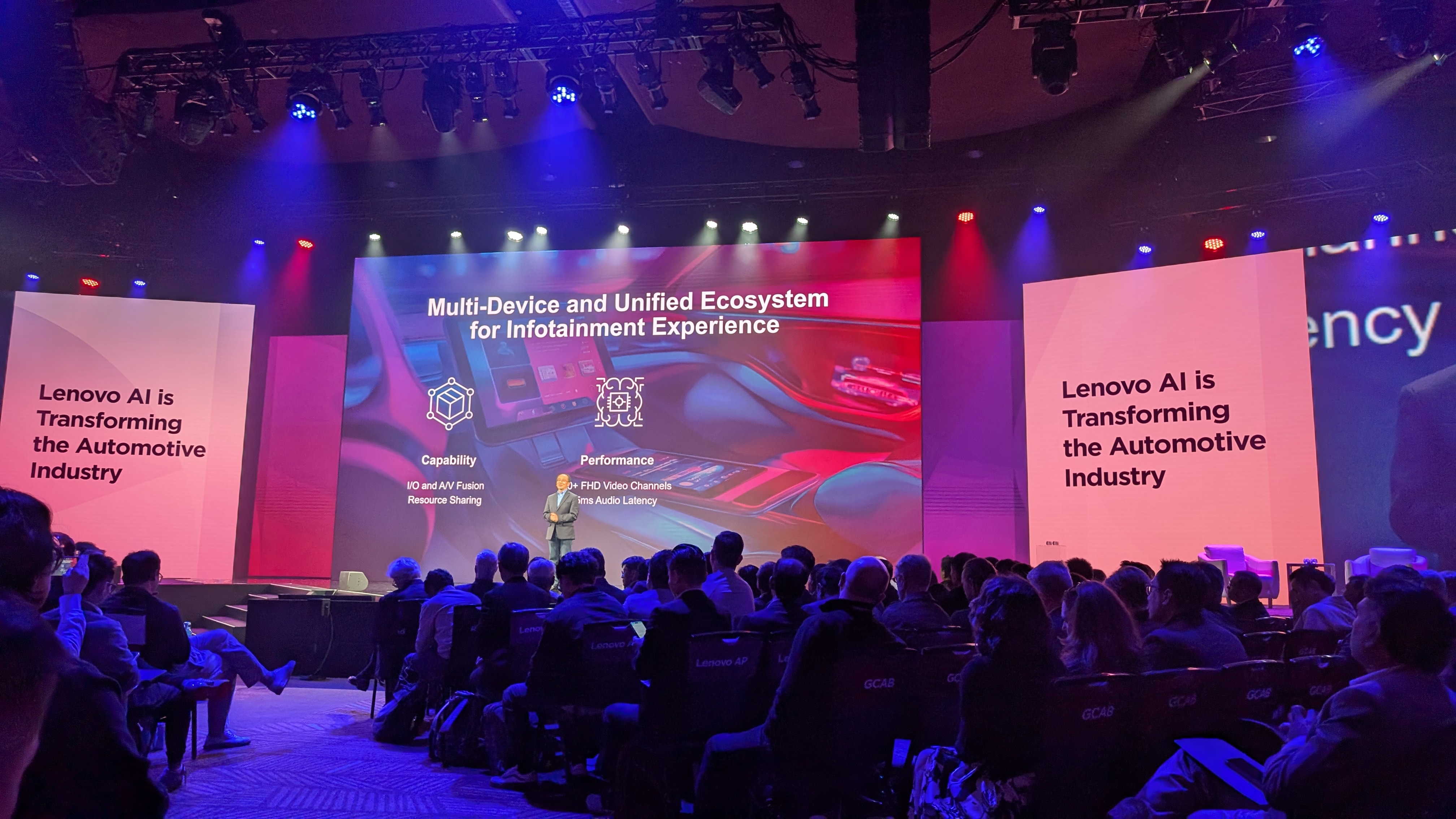
We're now turning from cars to getting ROI from AI - Ken Wong, EVP, solutions and services group takes to the stage.
Speed, ease and expertise are the key when it comes to delivering solutions and services, he says. Although there is a lot of excitement for AI across the world, there is also increasing fatigue, Wong notes - so showing ROI has never been more important.

Wong highlights the new Lenovo AI Fast Start service, which can get companies up to speed in around 90 days with a production-quality solution.
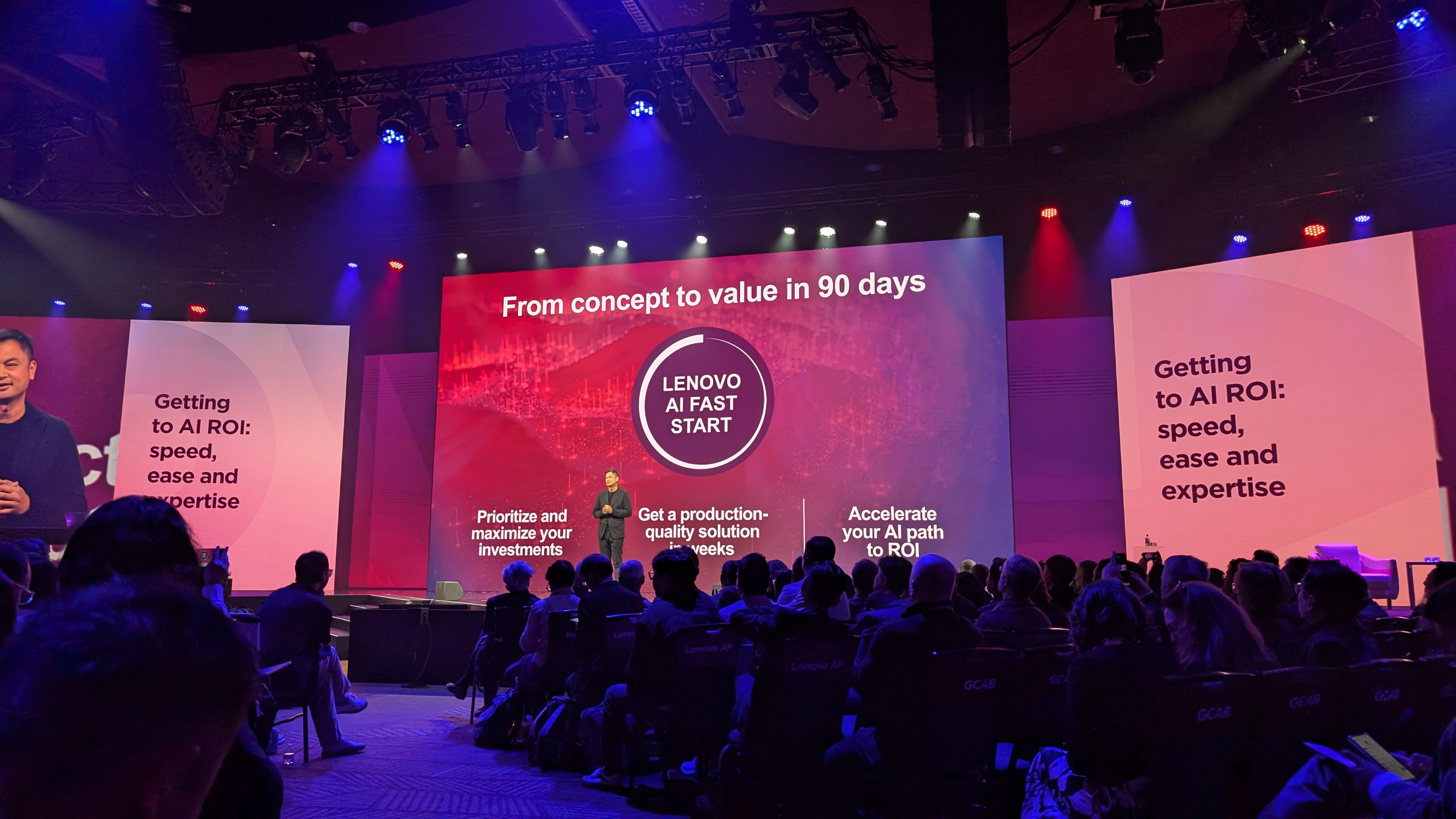
Another Nvidia representative - Kari Briski, VP of generative AI software products, to talk about the partnership between the two companies.
First off, NIMs - offering much faster and more effective AI solutions that can help with everything from solving crosswords to writing better code.
And then, when it comes to ROI, Nvidia is sharing NIM Agent Blueprints, reference workflows that can be customized to target your company's exact needs.
Next up is Linda Yao, who leads Lenovo's AI center of excellence, to talk about the Lenovo AI Library.
We're shown a selection of demos, from creating up-to-date marketing assets faster and more effecitvely, to generating automated legal document reviews, again making it much faster, and making sure documents are aligned with a company's own policies.
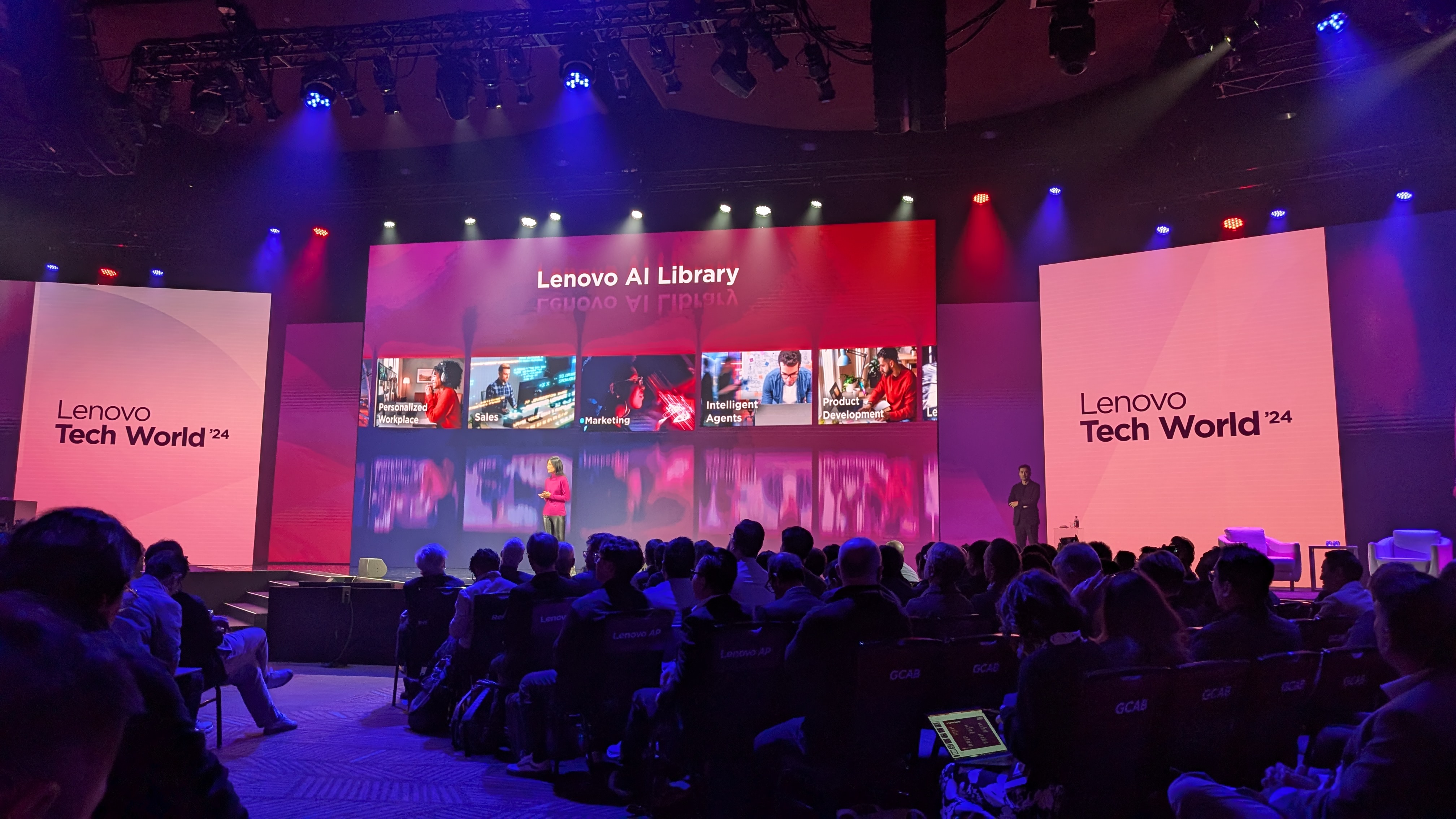
Wong returns to finish talking about expertise - something Lenovo has in spades.
The company worked with auto giant Lotus to build customized vehicles faster than ever - all while ensuring quality remained at a super-high level.
He also focuses on the issues of tech modernization, where past debt may hold some companies back - but Lenovo is launching a new Data and Tech Foundations for AI, a set of guidelines to help companies get ready for AI deployment.
We're reaching the end, but it's time for our VIP guests - Lenovo Chairman and Chief Executive Officer Yuanqing Yang comes to the stage, and is joined by Nvidia CEO and co-founder Jensen Huang.
The two companies have been working hard on hybrid AI, Huang notes.
"We're reinventing the entire stack," Huang notes, "This is going to be the largest industrial revolution we've ever seen."
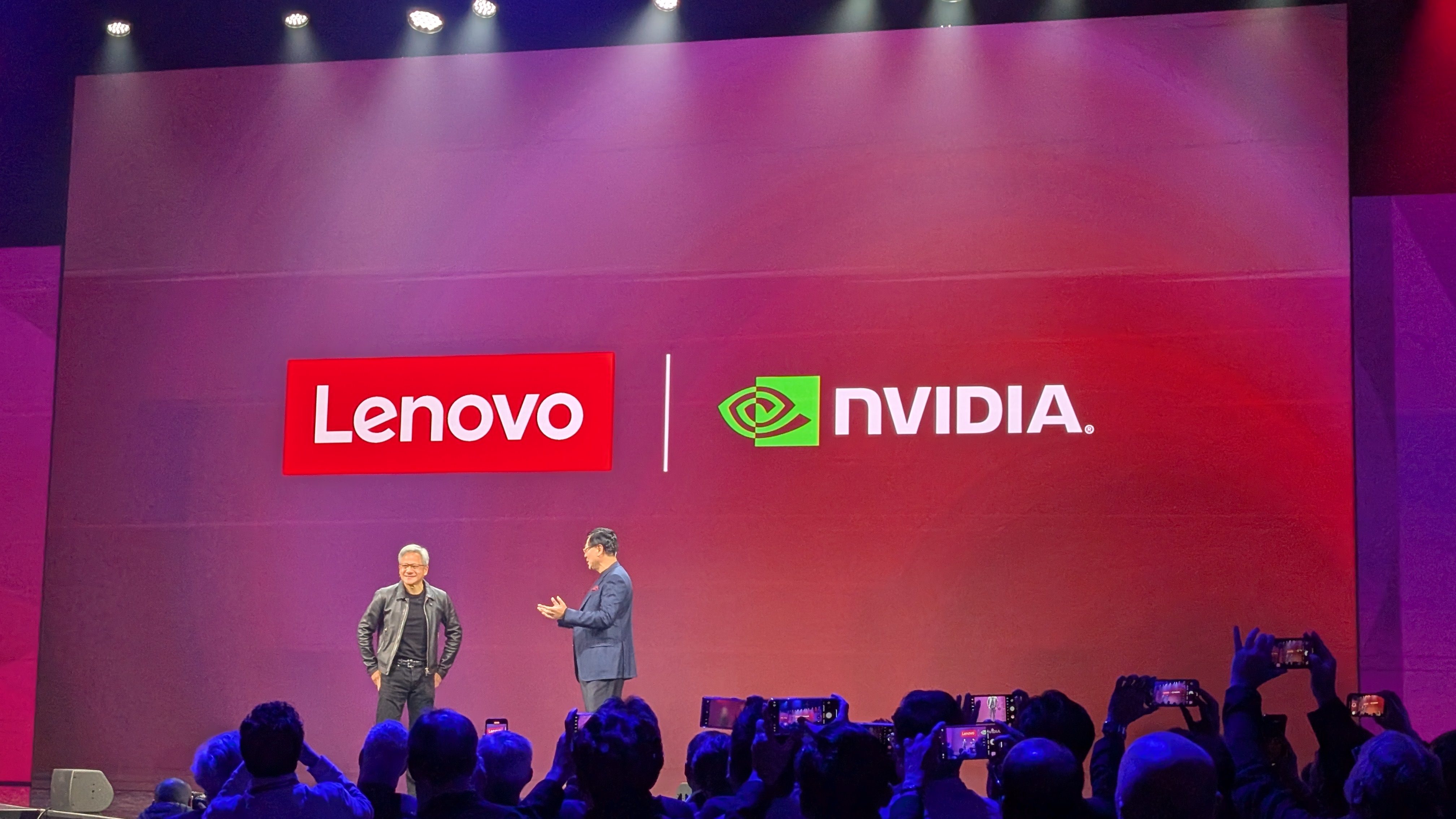
Asked on his views on agentic AI, Huang notes that AI in its most general form is basically robotic.
"There's going to be digital robots - we'll call them agents!", he says. "We're going to have informational robots - called agents - but also robots."
"These two artificial intellgences...will be the underpinning of the world's industries."
"We would like to achieve, essentially, superhuman productivity."
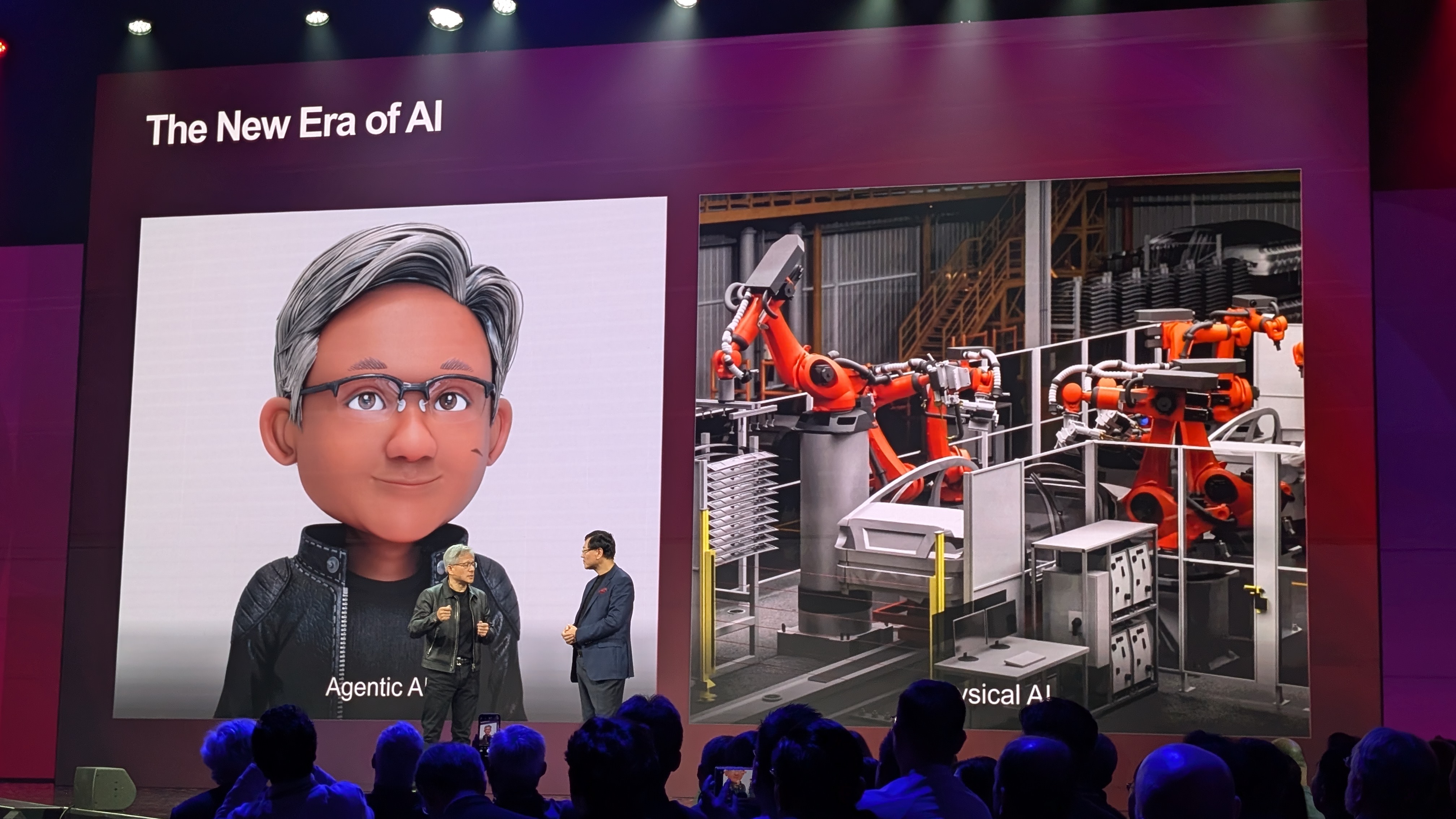
Huang notes that industrial AI is a huge possible use case - and Nvidia is partnering with Lenovo on this.
The two companies are announcing Hybrid AI Advantage, a full end-to-end hybrid AI factory, which Yang outlines, noting it combines models, services, software and data infrastructure.
"We are working together to make hybrid AI more sophisticated," he notes.

Yang says Nvidia is bringing "a lot of value" to the partnership, which will see customers also move towards energy-efficient goals, as the latter's new Blackwell chip offers huge advantages.

"These new computers are effectively factories," Huang says of the new Blackwell-based systems.
"We have the ability, because we build the entire AI factory from end-to-end."
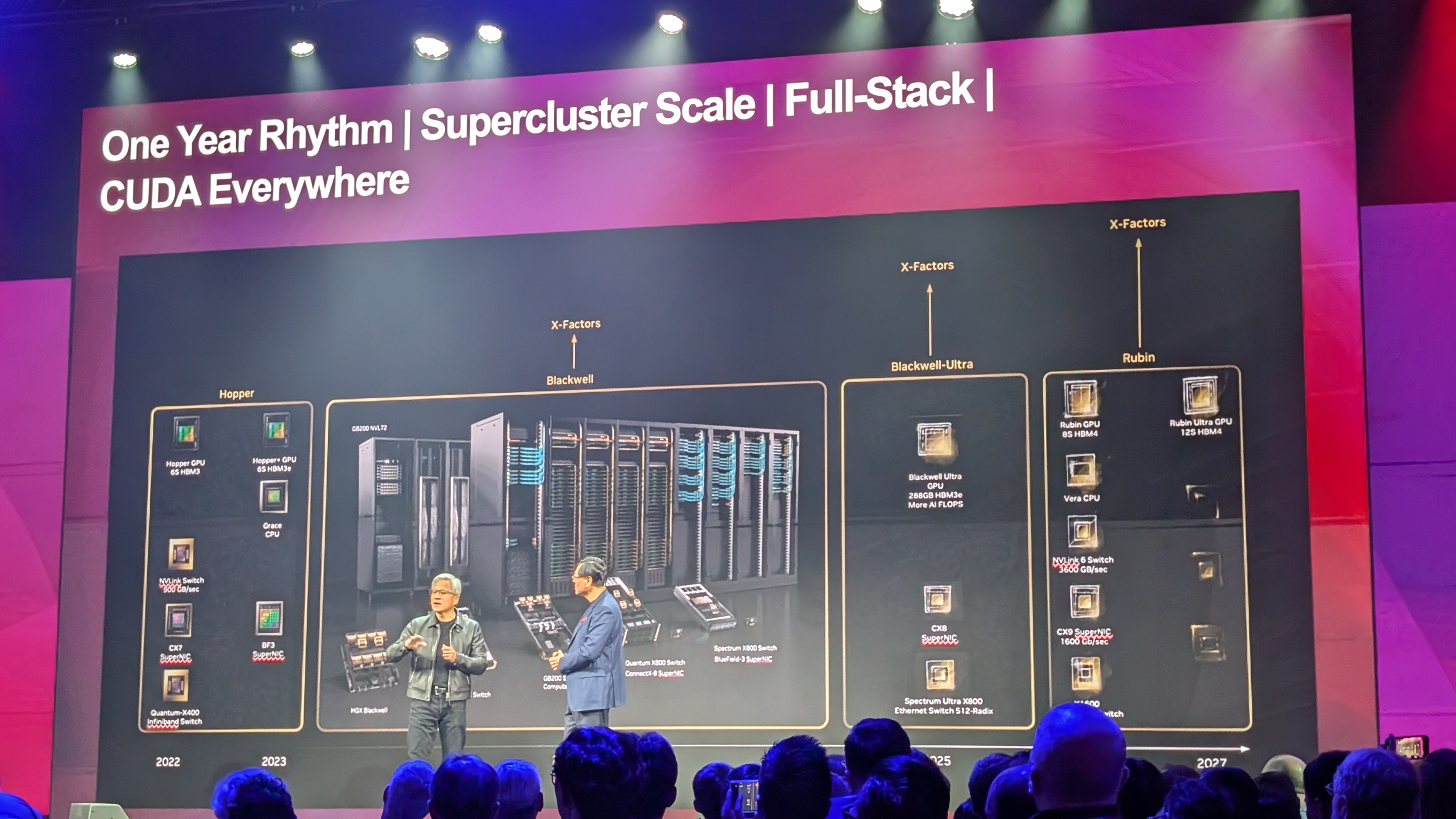
To finish up, we're even getting a full dramatic unveiling of the new ThinkSystem SC777 with Nvidia Blackwell.
"The world's coolest accelerated computing by Lenovo" features the latest Neptune liquid cooling, and unmatched power and efficiency.
There's also a new AI computing DCU for autonomous driving - the Nvidia Drive AGX Thor with Blackwell.
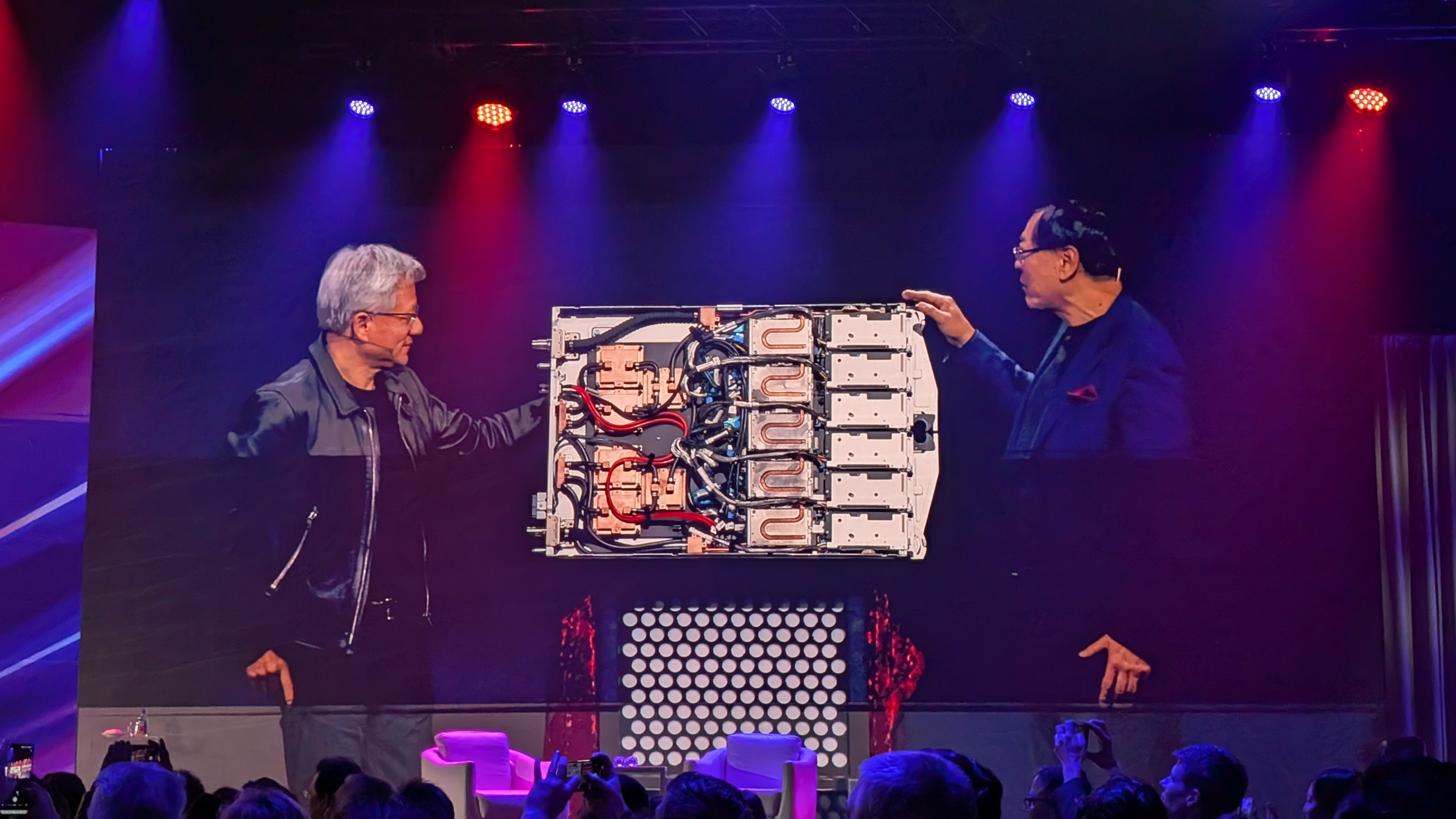
Final thoughts from Huang?
"Go Lenovo!" he shouts, to massive cheers from the audience.
There's still time for one more mystery announcement....introduced by a football (soccer for you Americans) freestyler?
It's only FIFA President Gianni Infantino - with the actual World Cup!
Lenovo is going to be the official technology partner of FIFA going forward, Infantino announces, starting at the 2026 Men's World Cup.
"FIFA has big ambitions in the tech space," Infantino says.

FIFA is ready to embrace AI and make the game more accessible to people across the world, Infantino says.
Yang hands over a signed AI PC to Infantino, with the president getting a signed football in return - bit of an unbalanced trade, in our opinion.
And with that, it's a wrap on the second keynote! We'll be back soon, so stay tuned...
We're back, and straight into a media Q&A with Yuanqing Yang, Chairman & Chief Executive Officer, Lenovo, and Dr. Tolga Kurtoglu, Lenovo Corporate Chief Technology Officer and Senior Vice President.
First up is a question about Lenovo's relationship with Intel - which seemed very chummy on stage when Yang was talking to Pat Gelsinger.
Yang replies that the two have known each other a long time, so it's understandable the relationship is so strong.
Next is a question about agentic AI, and how data protection and privacy are crucial considerations.
Kurtoglu says the company has a responsible AI framework, that it is determined to stick to going forward, even as its portfolio grows.
A question about the effects of AI on privacy and personal preferences is next - with Kurtoglu saying AI needs to be proactive, rather than reactive.
Learning about the user is an important consideration, he adds - once that mapping and understanding is there, then they have autonomy to take action on our behalf.
The panel is asked a question about AI being a bubble - as it doesn't seem to make much profit?
Yang replies that the industry is still in its infancy, and that the company has a responsibility to prepare and ensure the data being used is ready - such a full-stack offering has a lot of hurdles, ramping up the costs!
"We certainly don't view this as a hype...we're seeing an accelerated cycle of innovation," Kurtoglu adds.
Another question about Lenovo's strong partnerships - "no company can do everything!" Yang answers.
Lenovo really believes in an open ecosystem, he adds, showing the importance of a wide range of partnerships.
Kurtoglu adds that one of Lenovo's main strengths is its commitment to an open ecosystem, as partnering with many companies means customers will end up with better-performing solutions.
Asked what Lenovo can offer as opposed to its rivals in the agentic AI space, Yang notes every business is different, so their needs will be difficult.
"We have a lot of experience...we can help customers design, deploy, run at scale," he says.
Finally - a question about which new tech shown off today will have the biggest effect on daily lives?
"Everything!" laughs Yang, before highlighting enhancements to AI PCs and 3D screens as particular advances.
And with that, it's a wrap on Lenovo Tech World day one - thanks for joining us, and stay tuned to TechRadar Pro for more news and features to come soon!